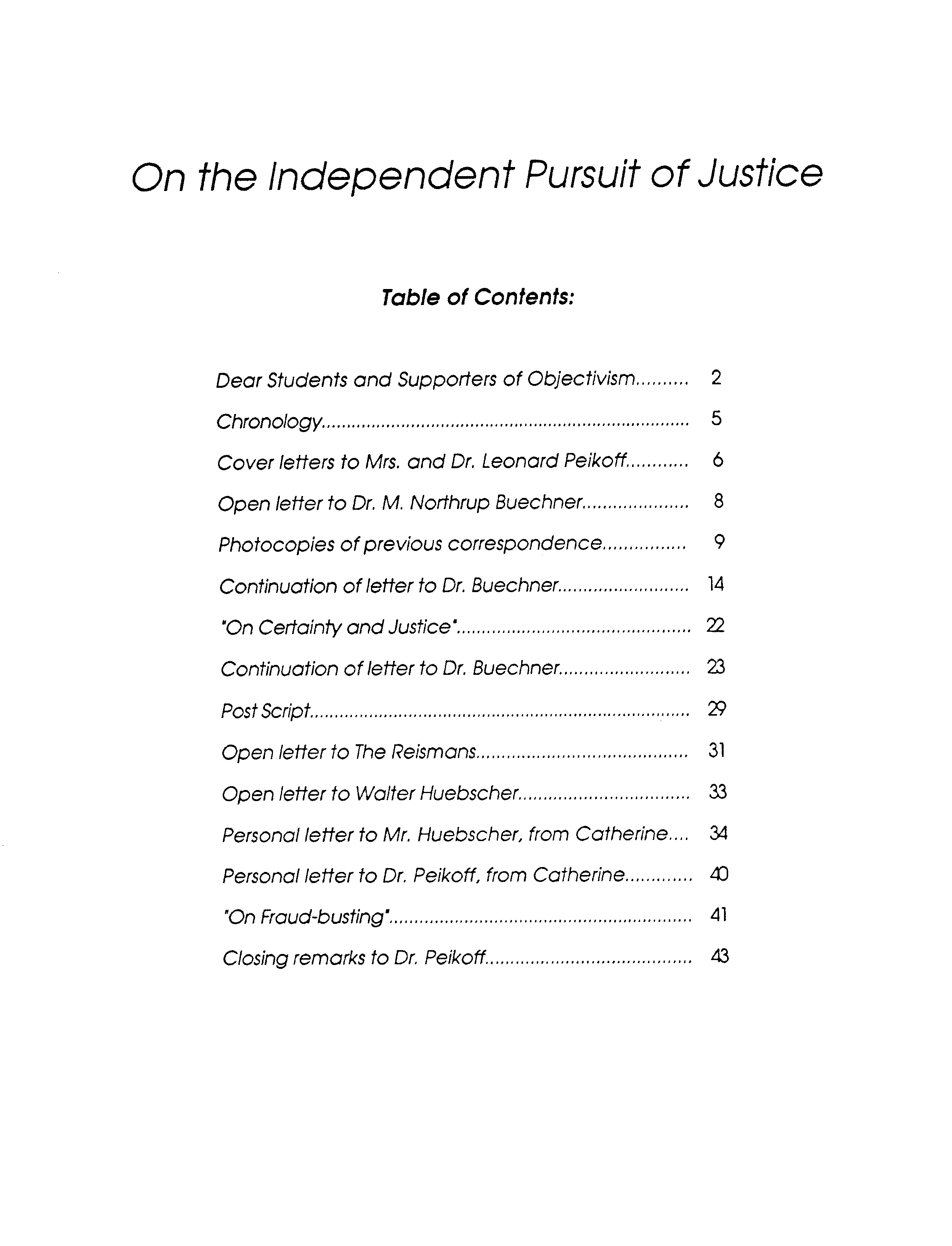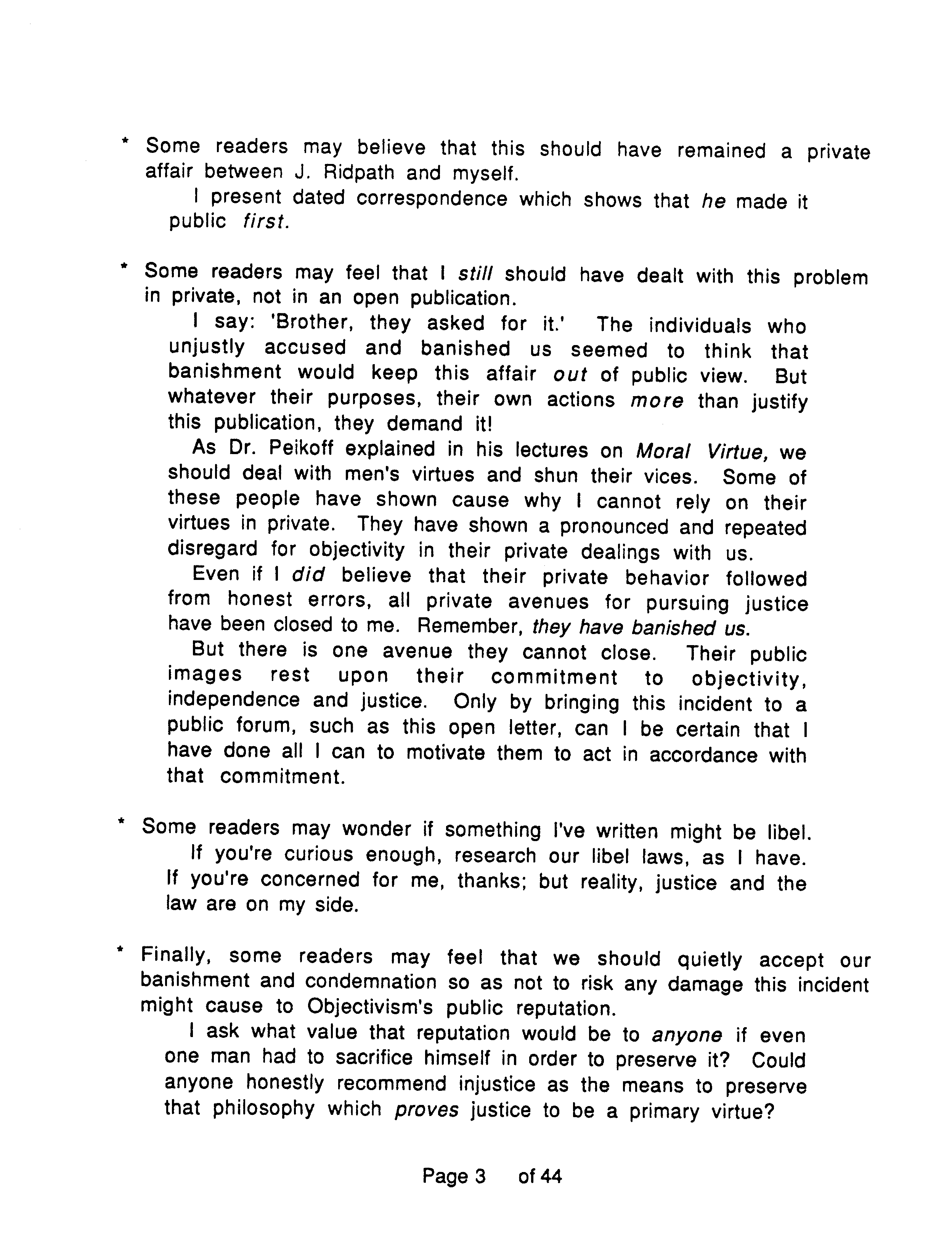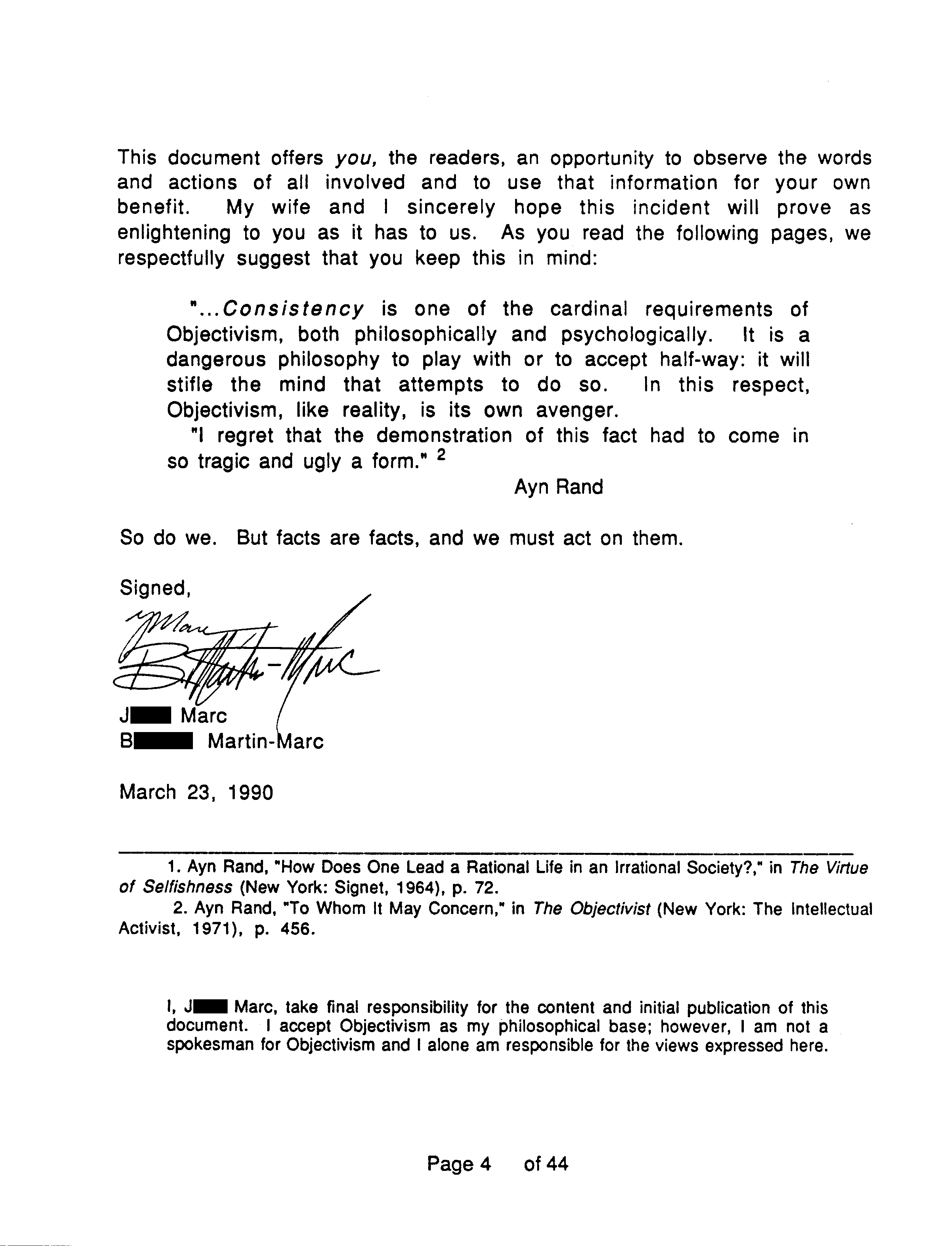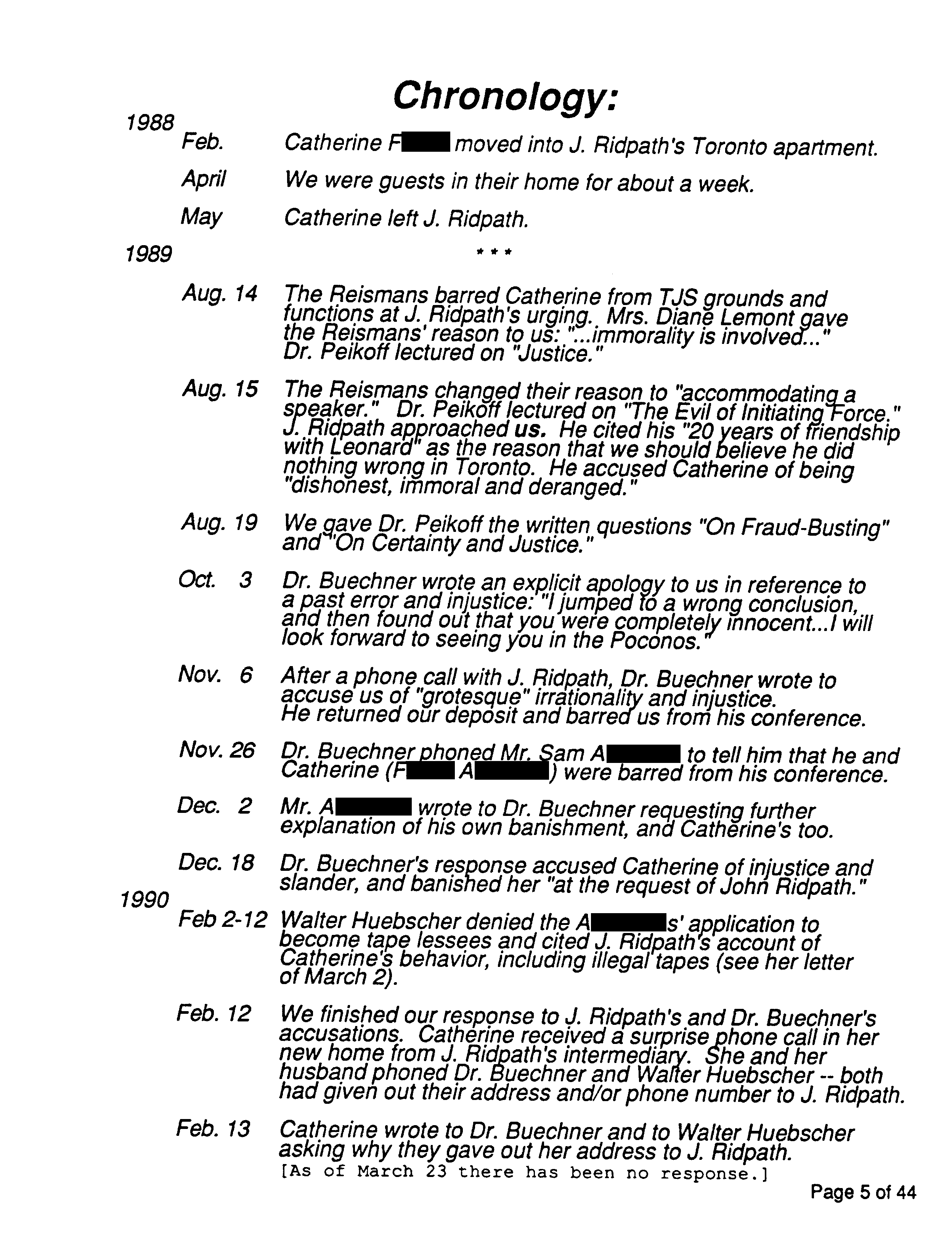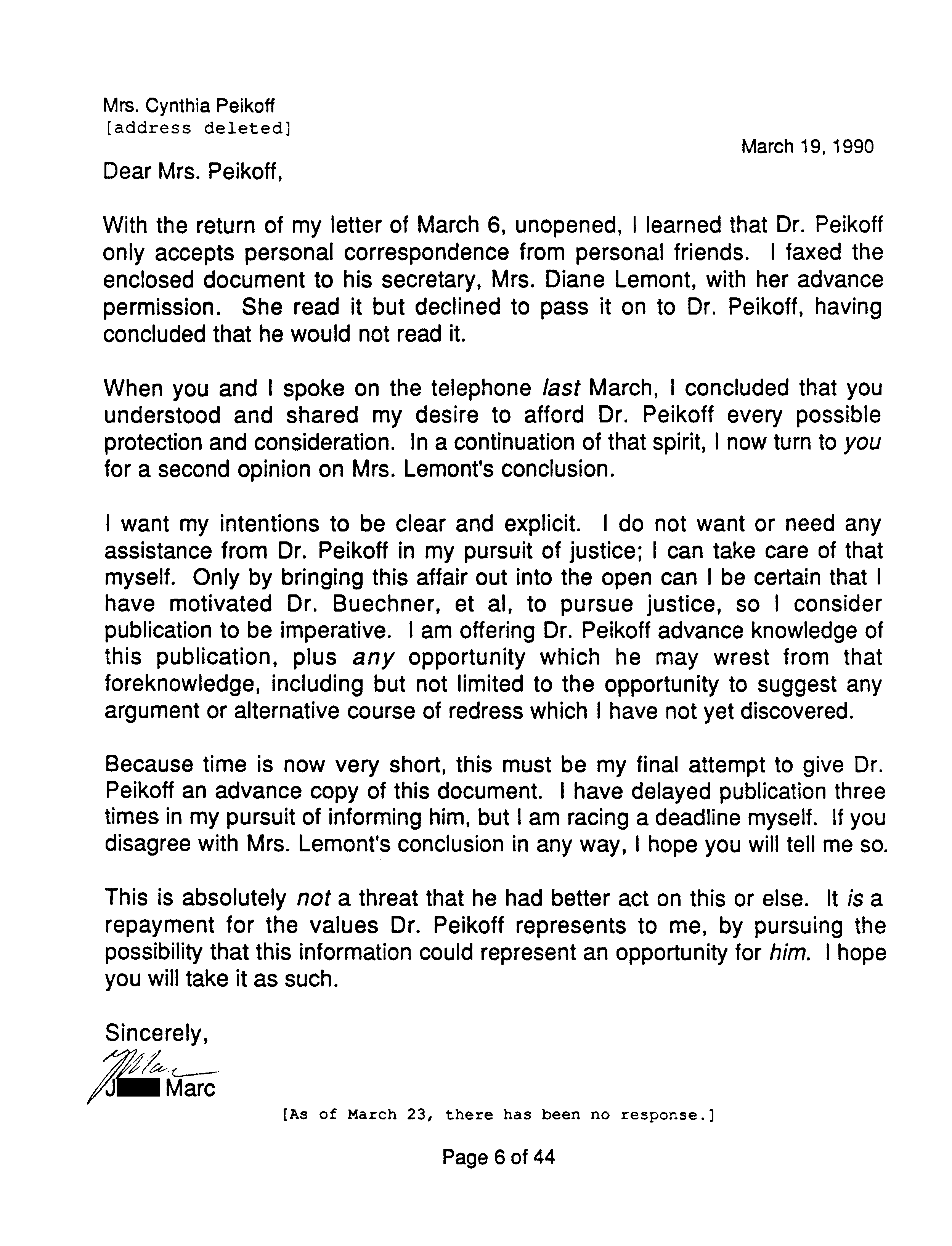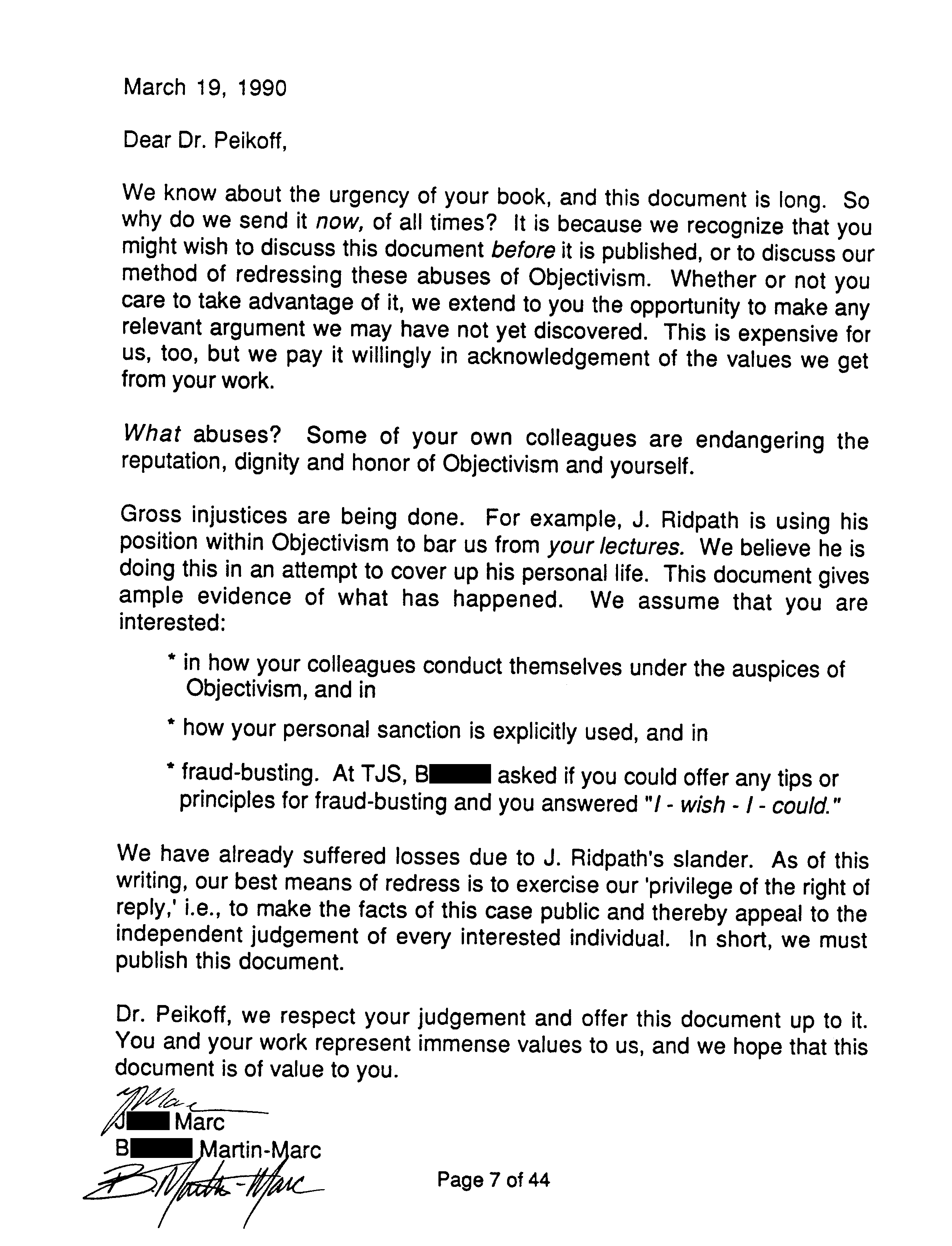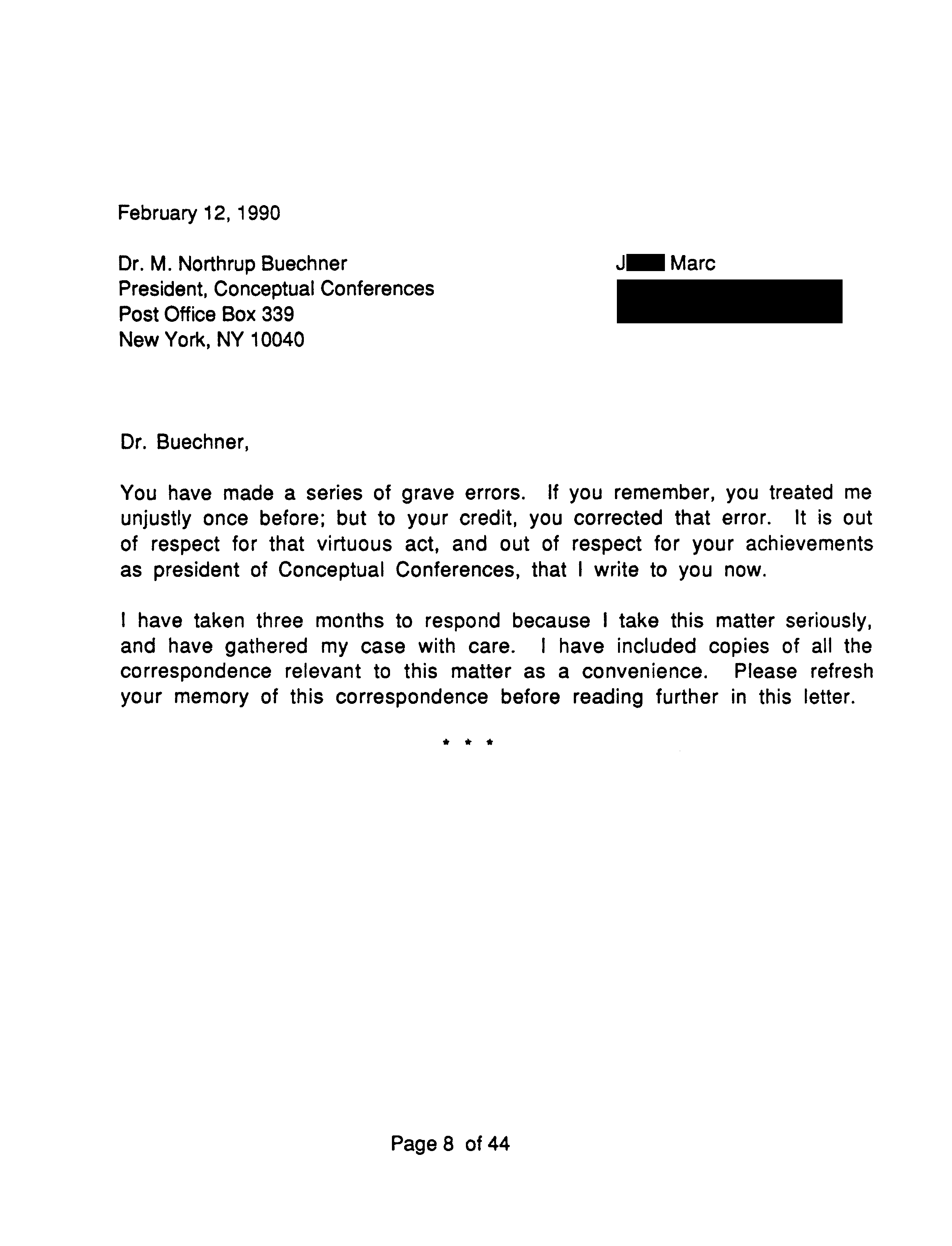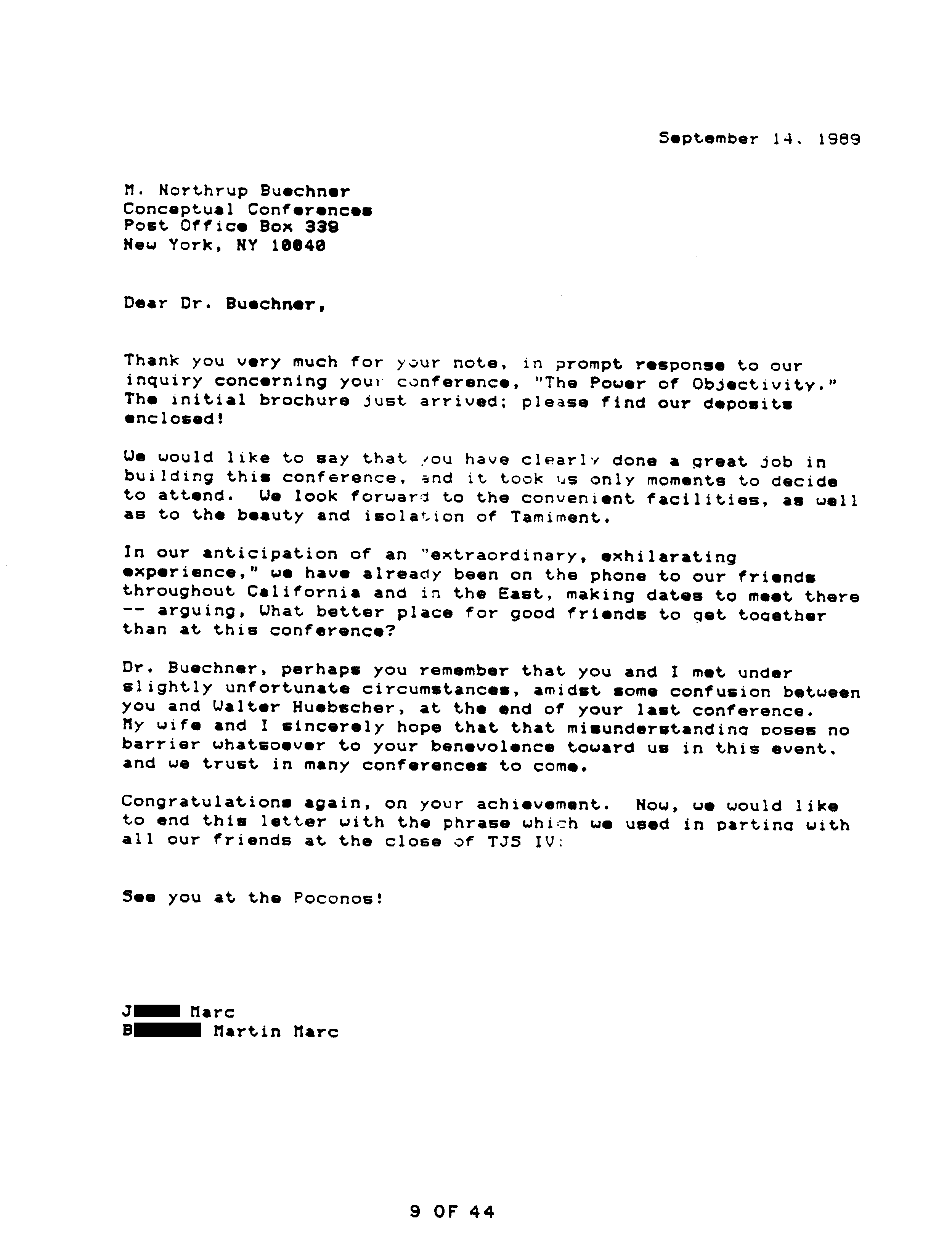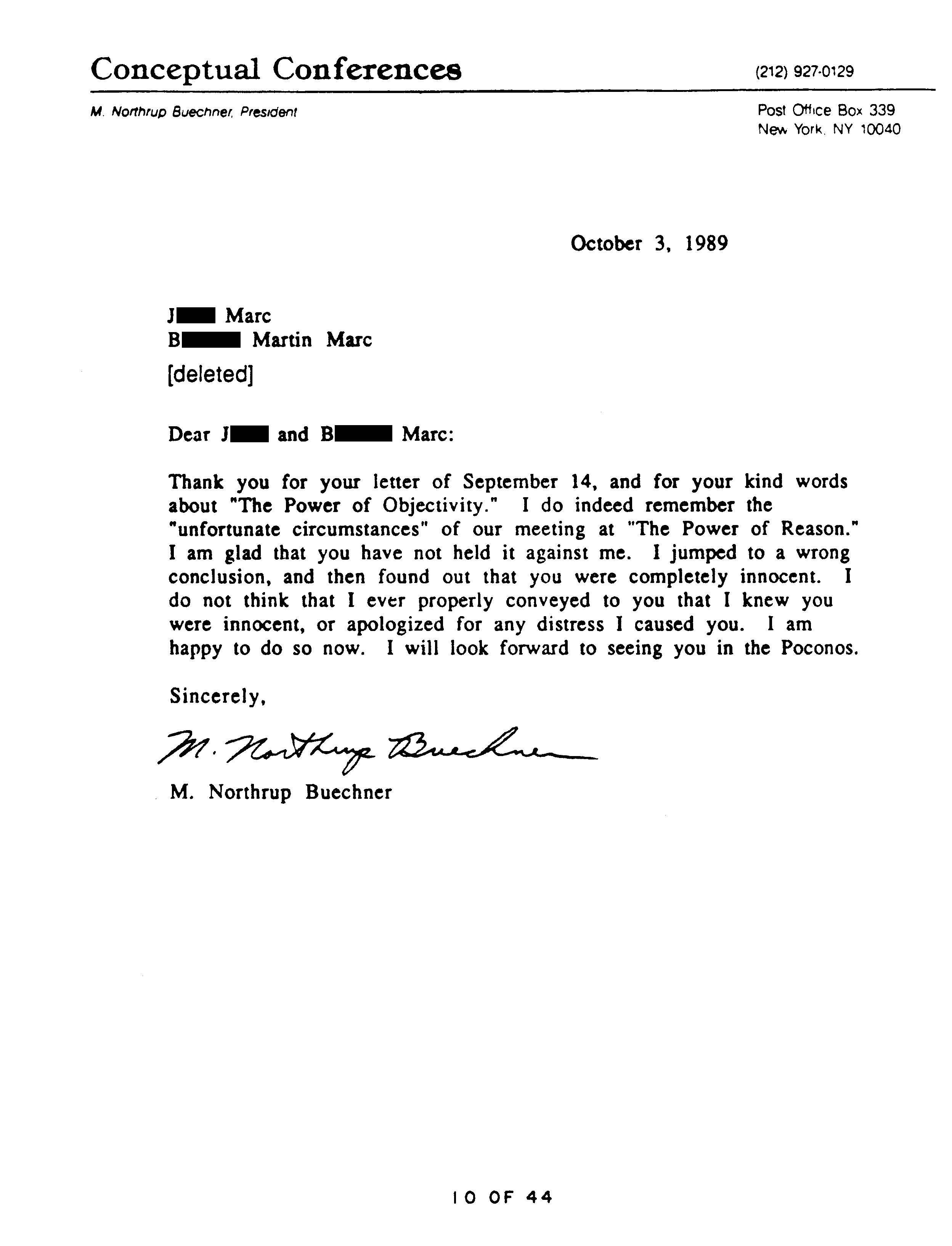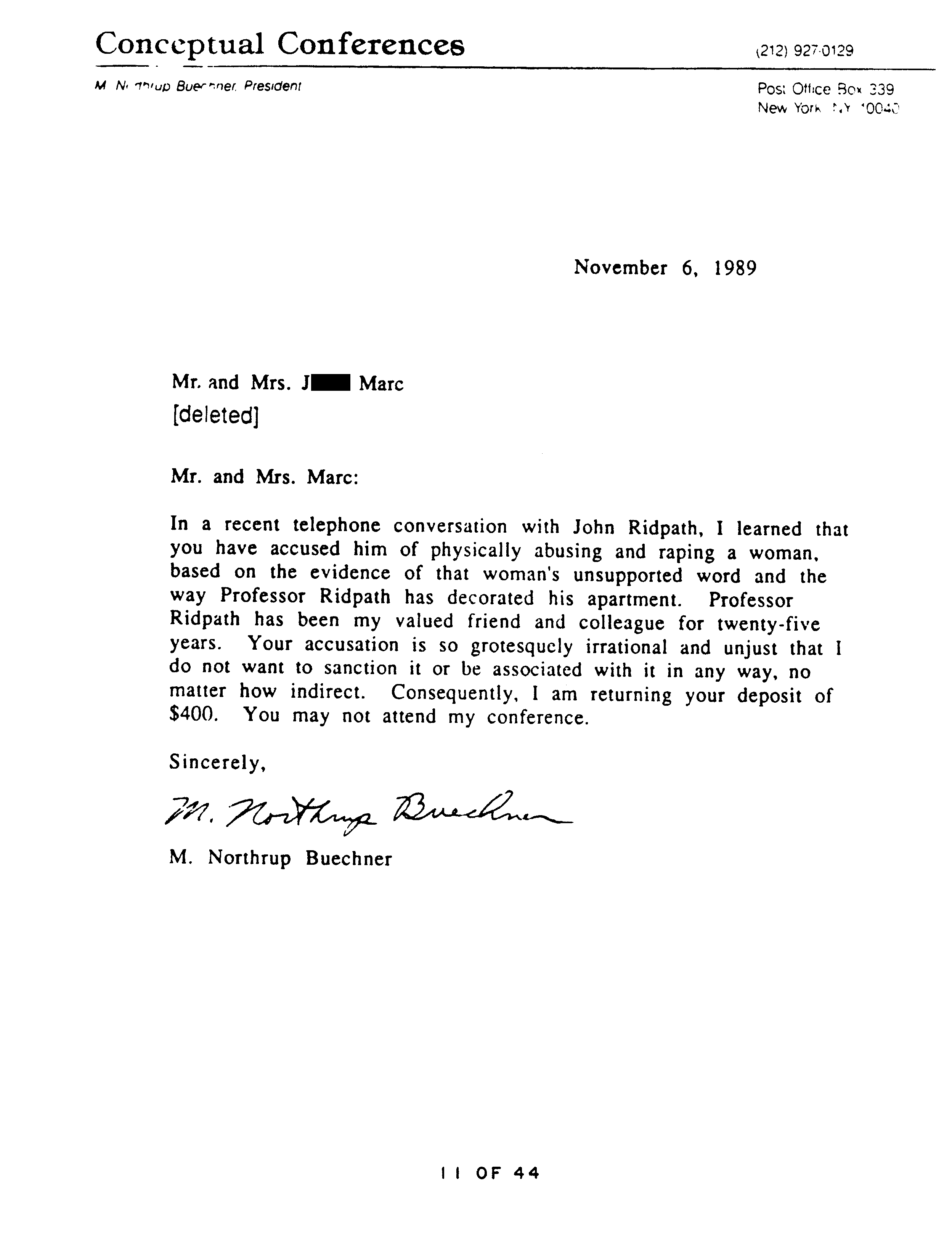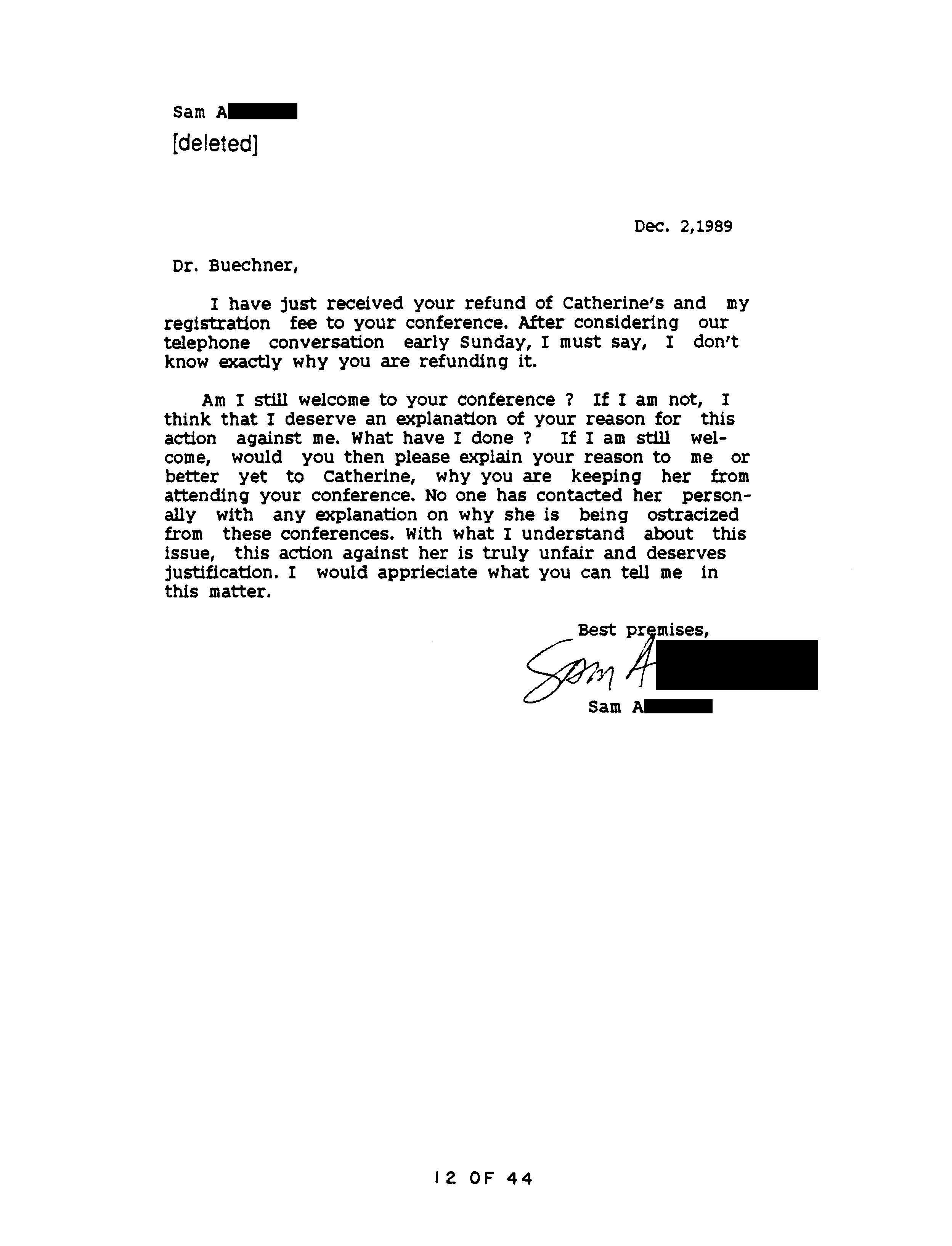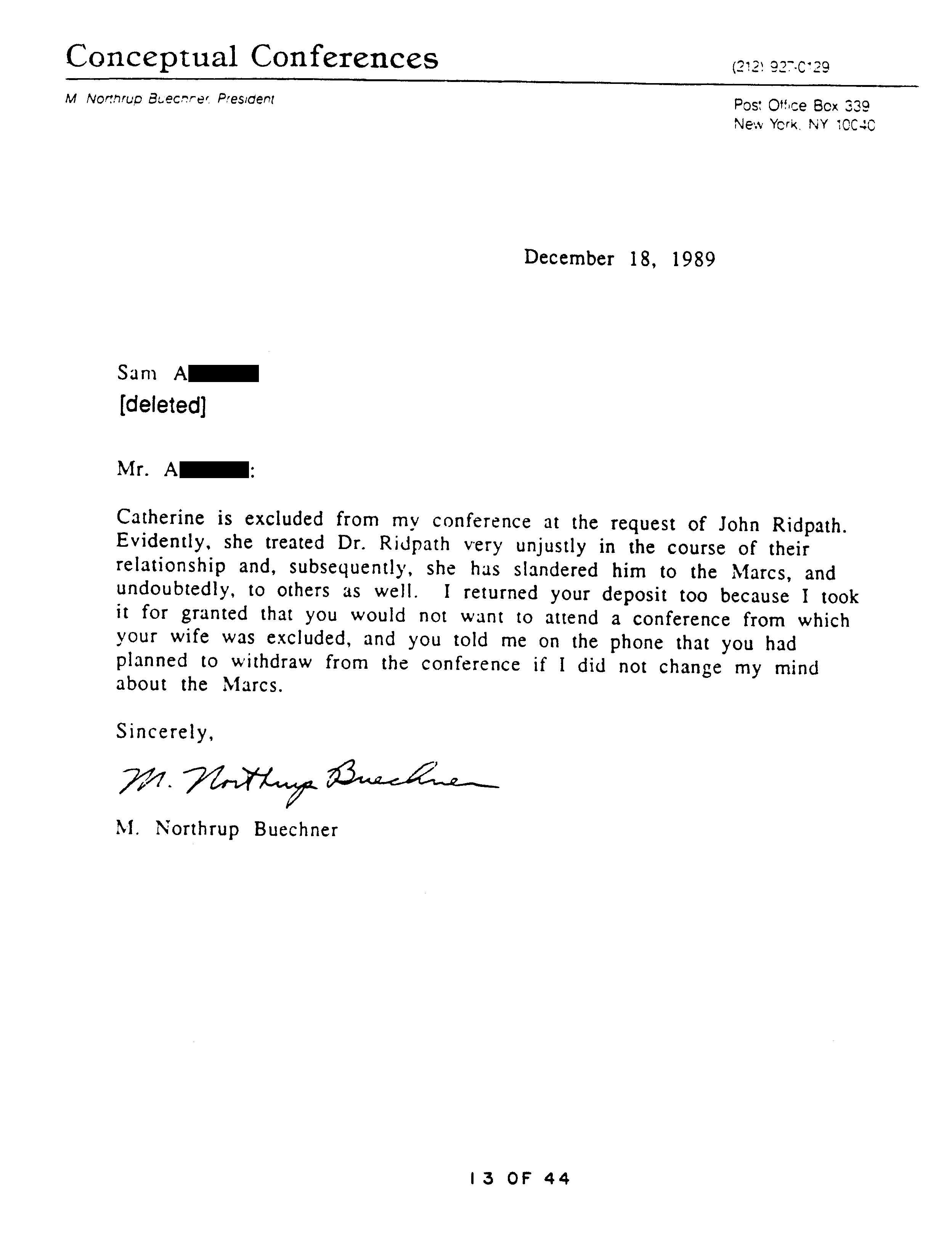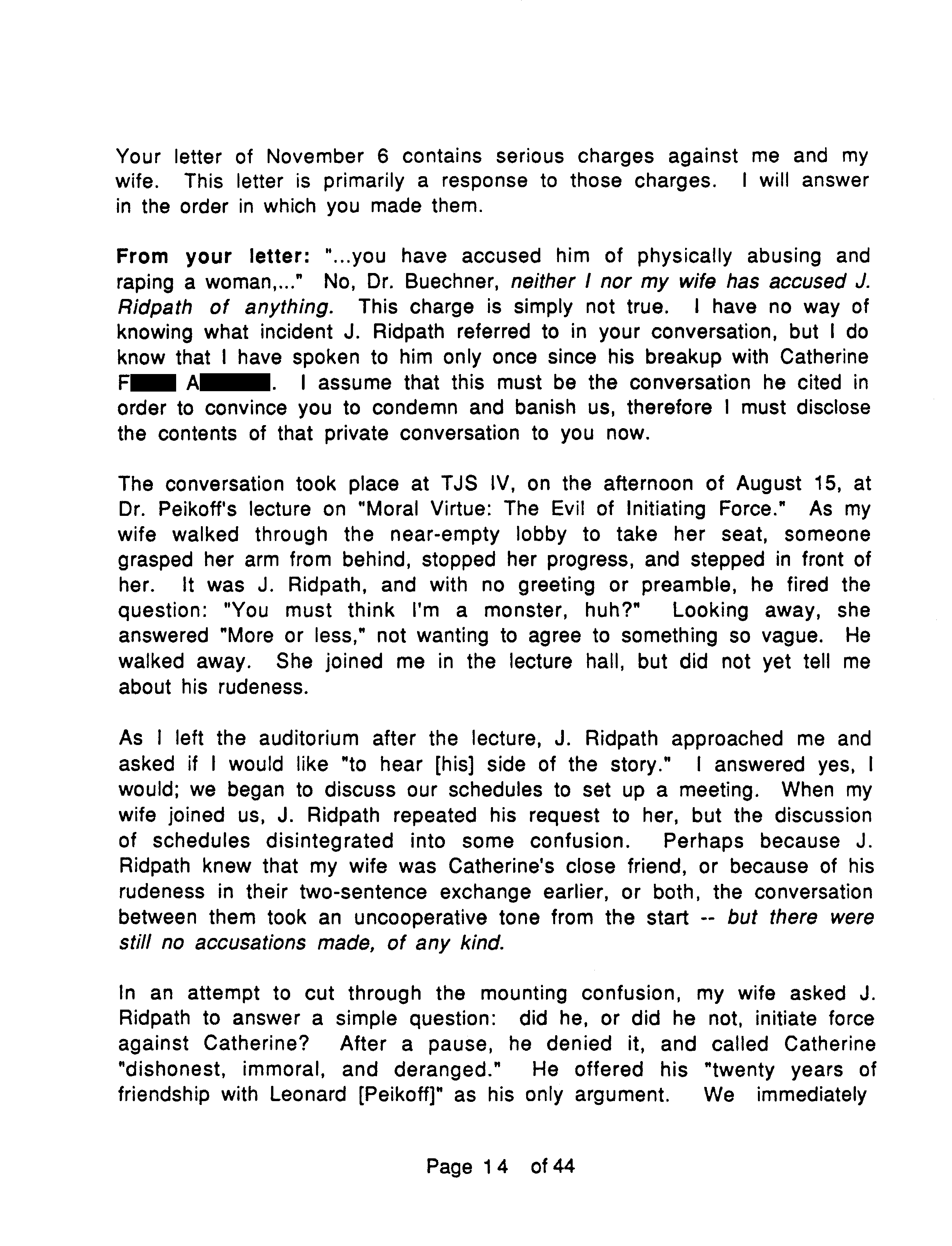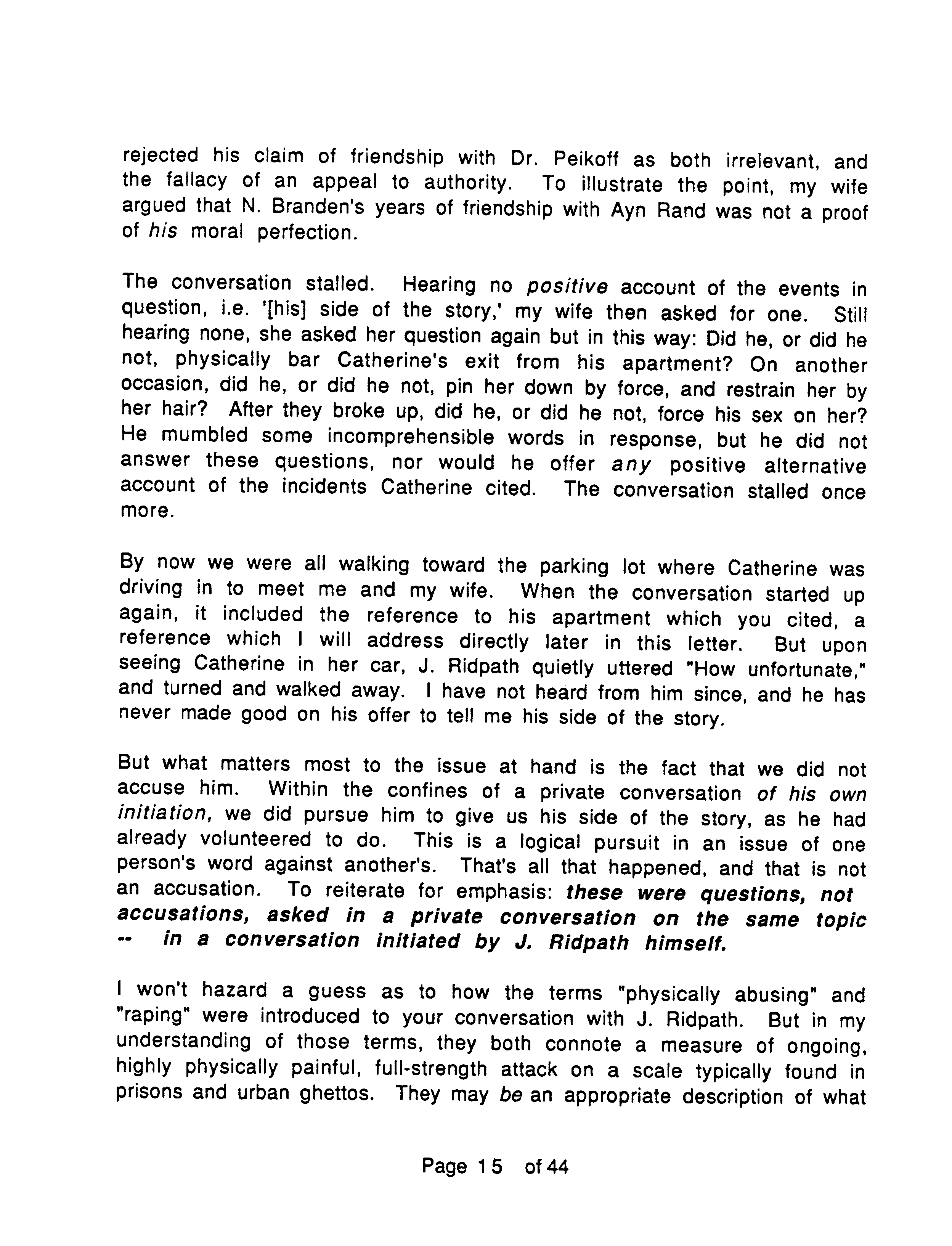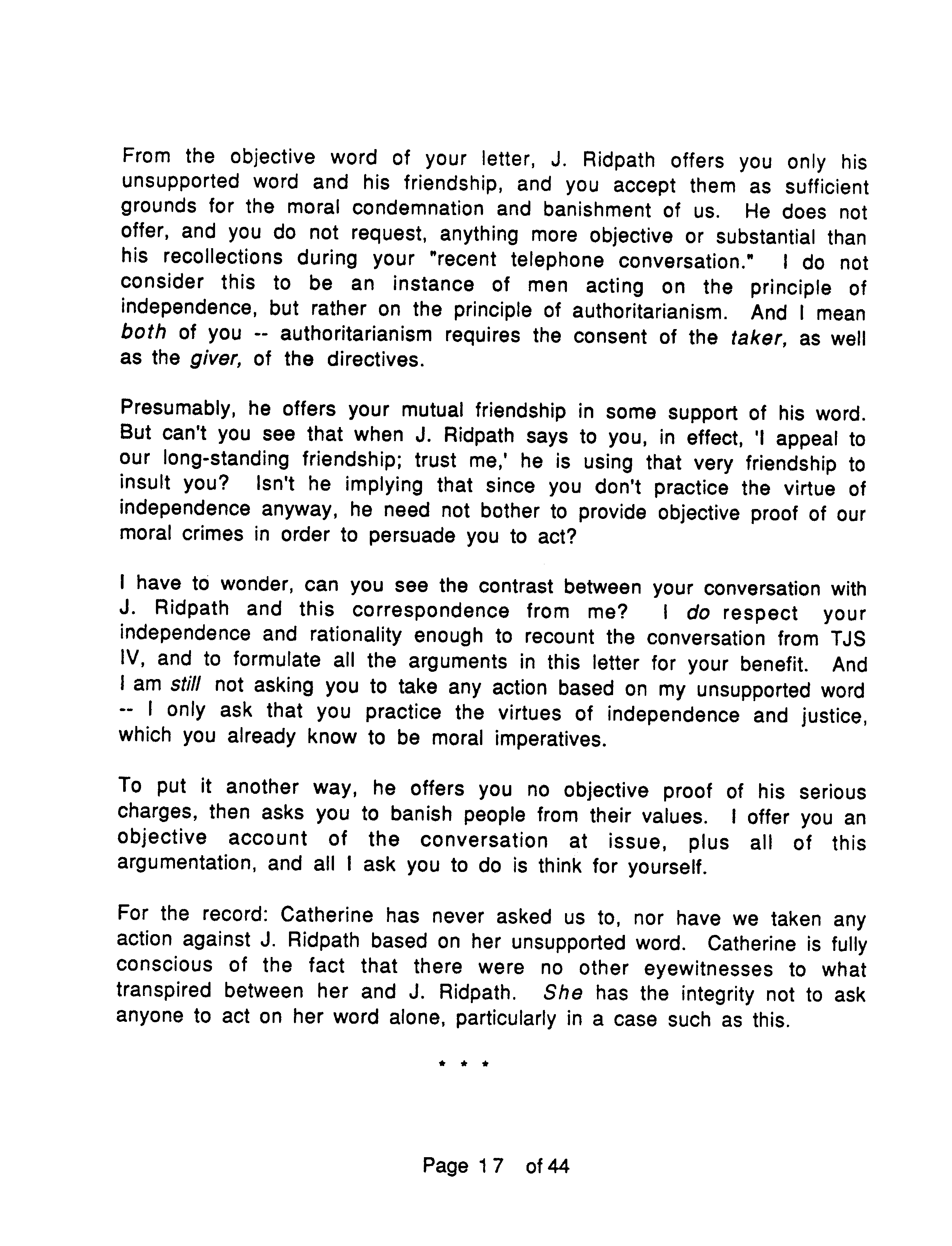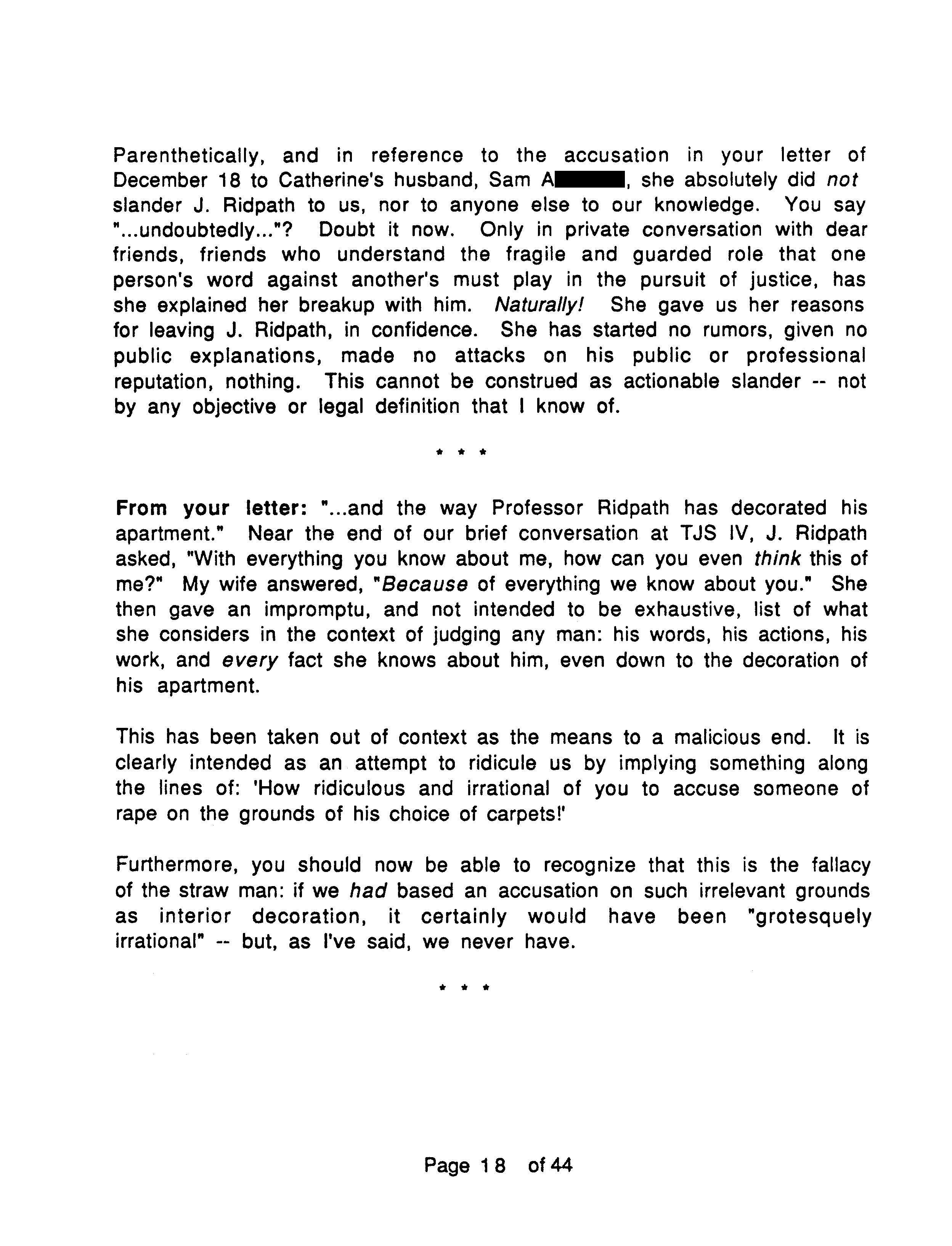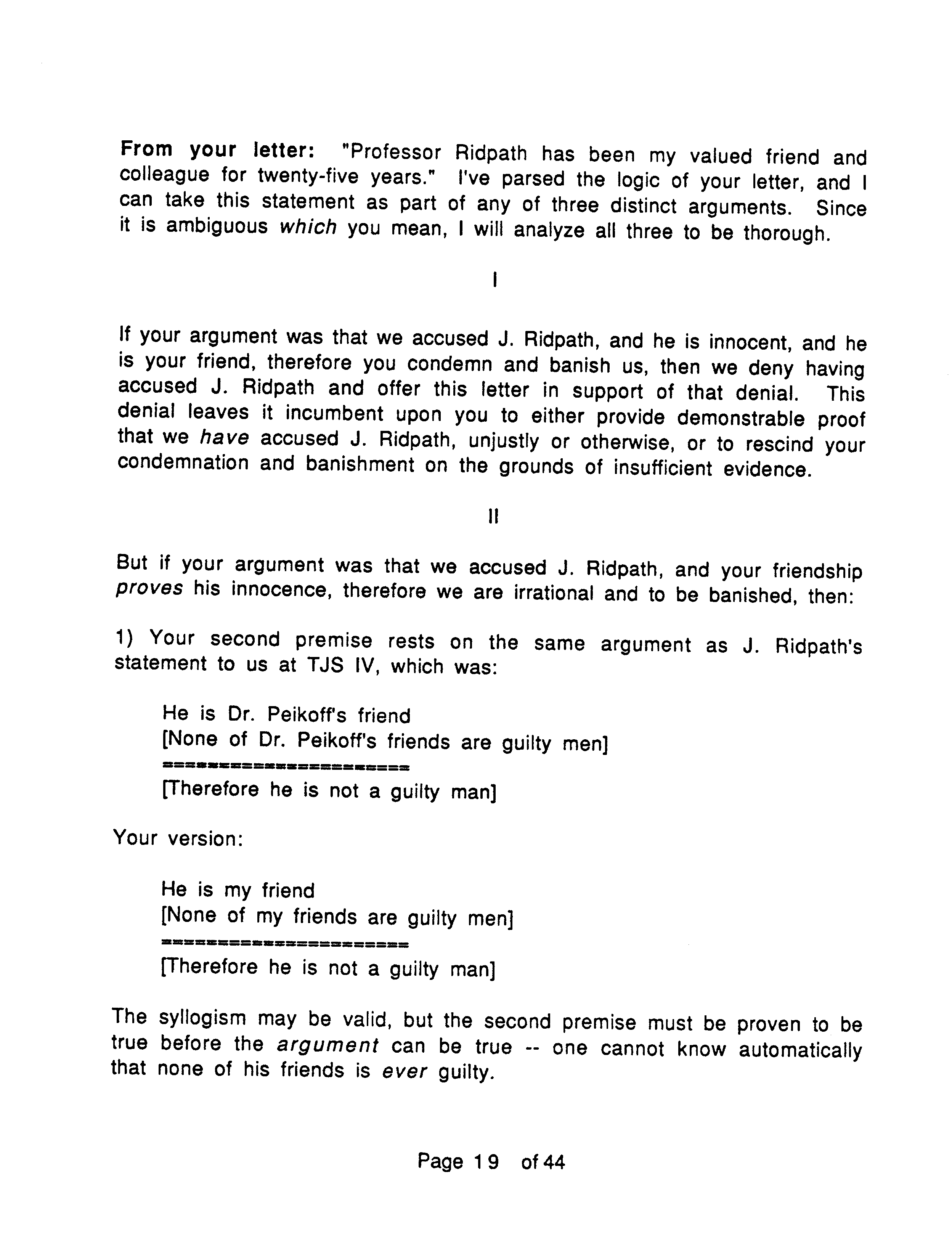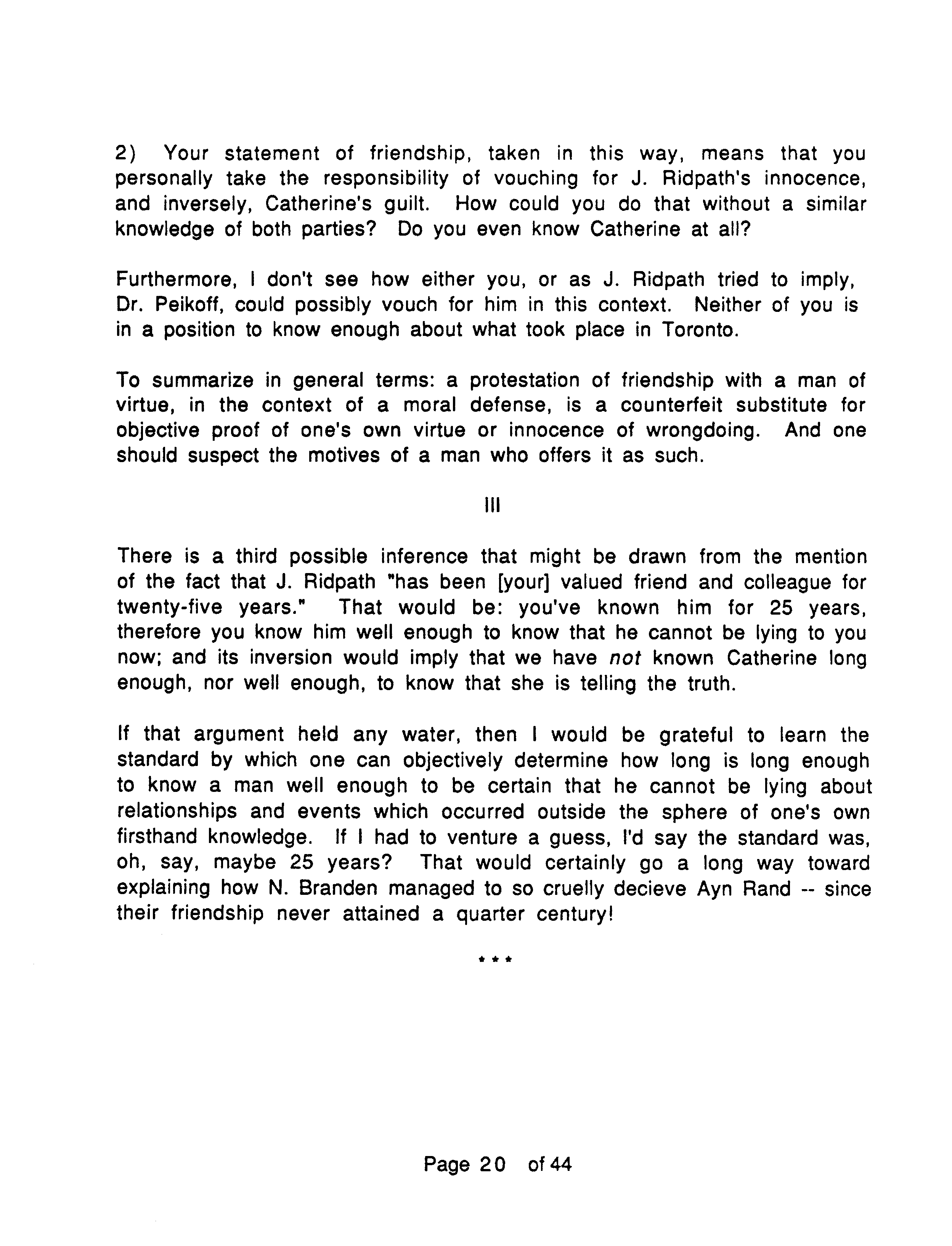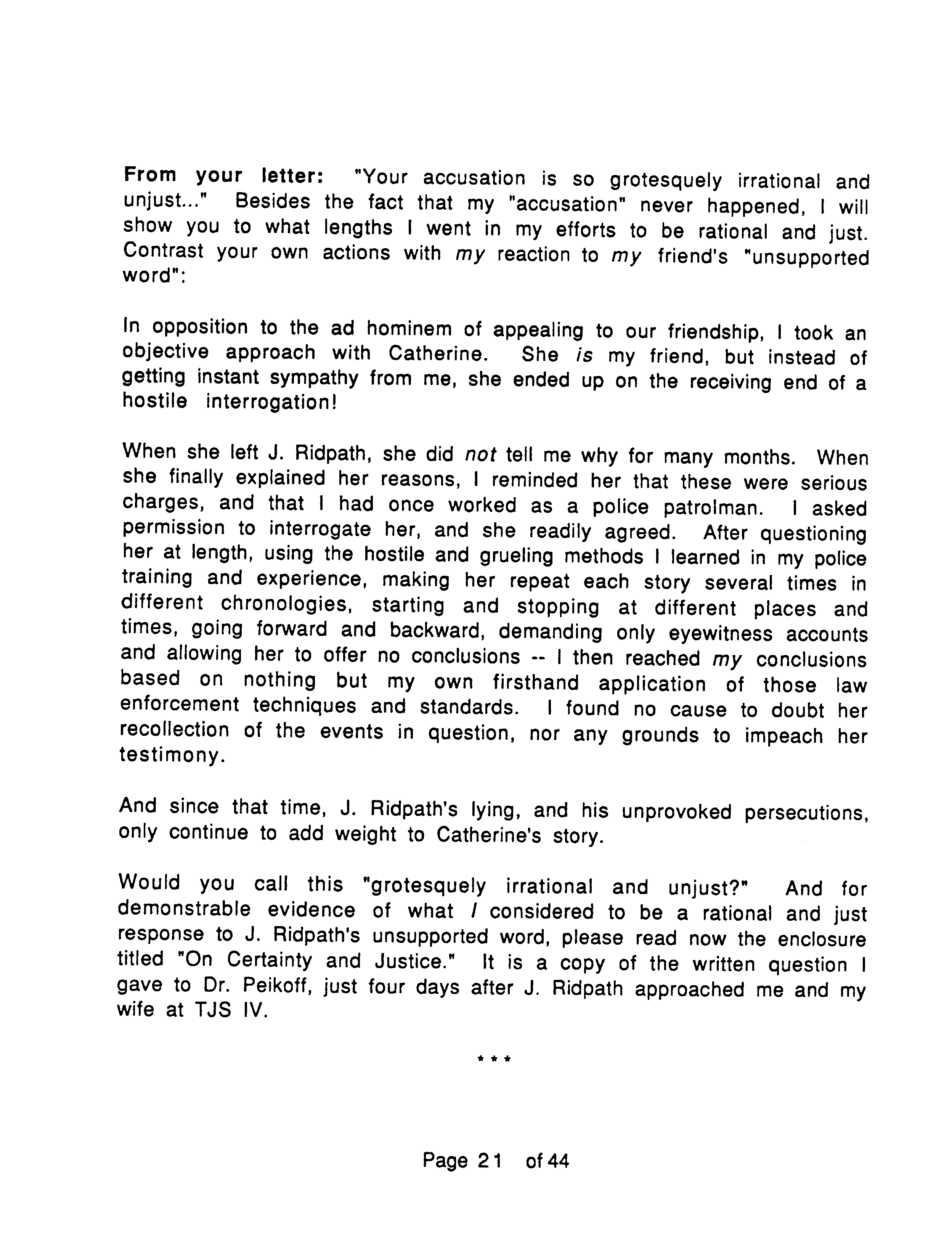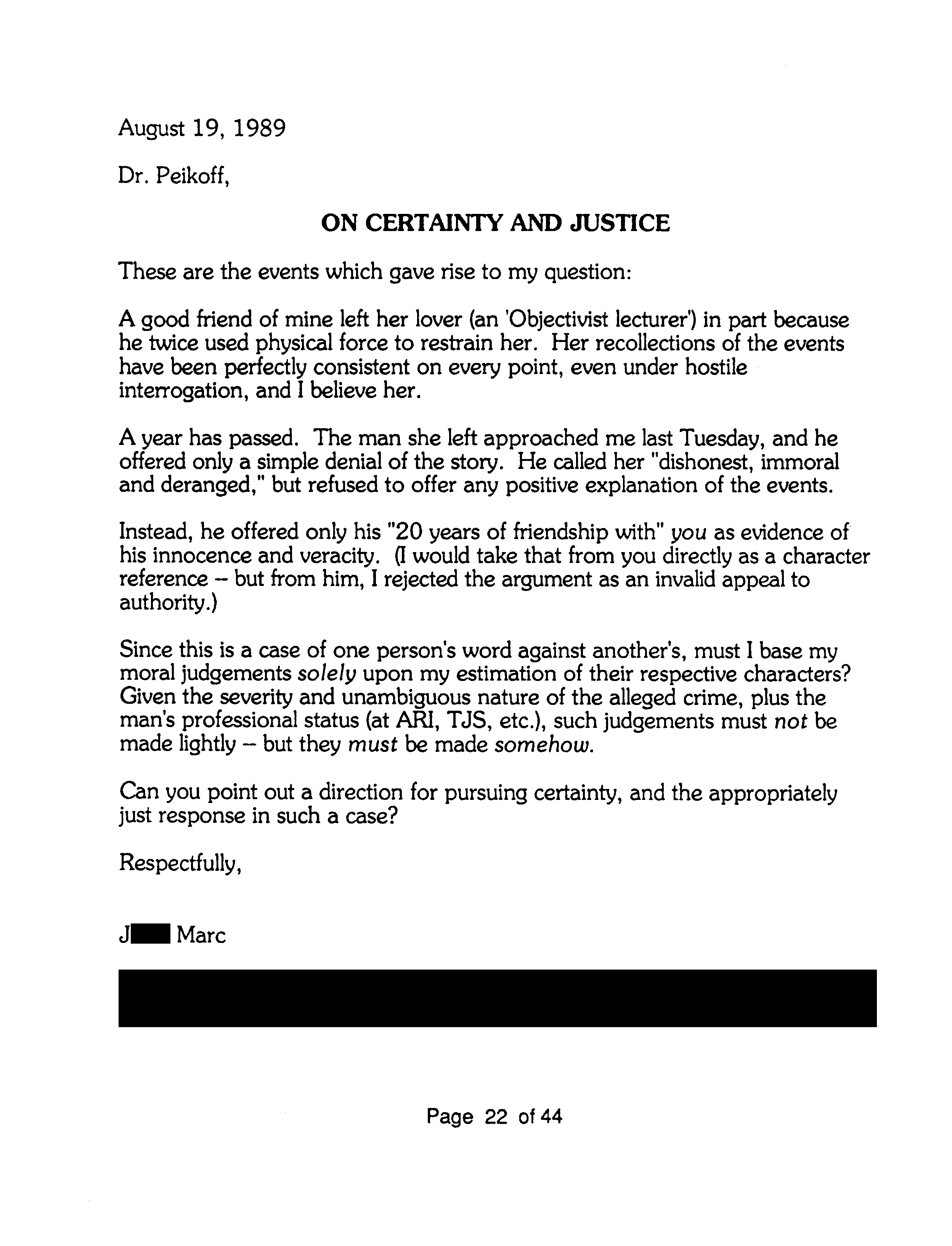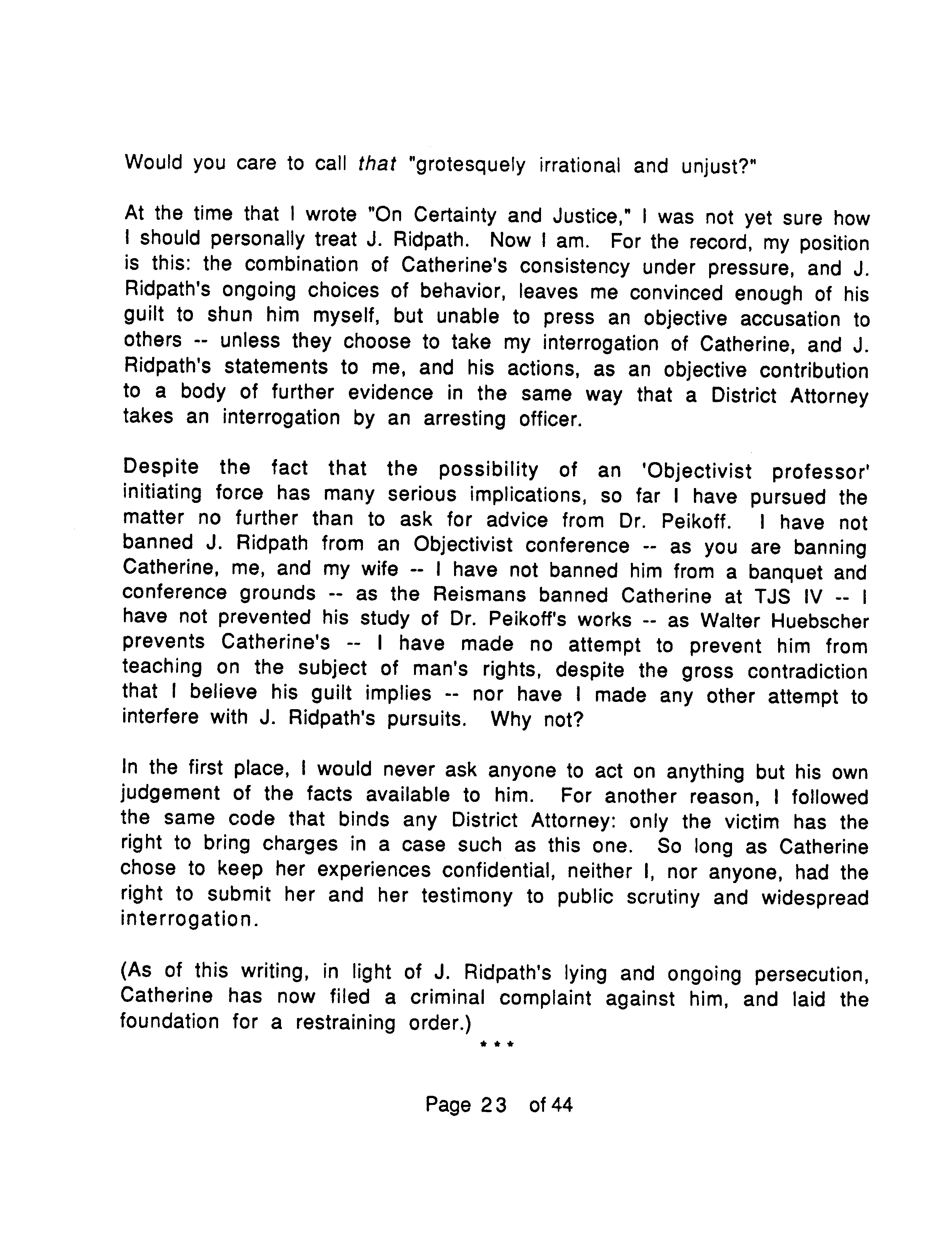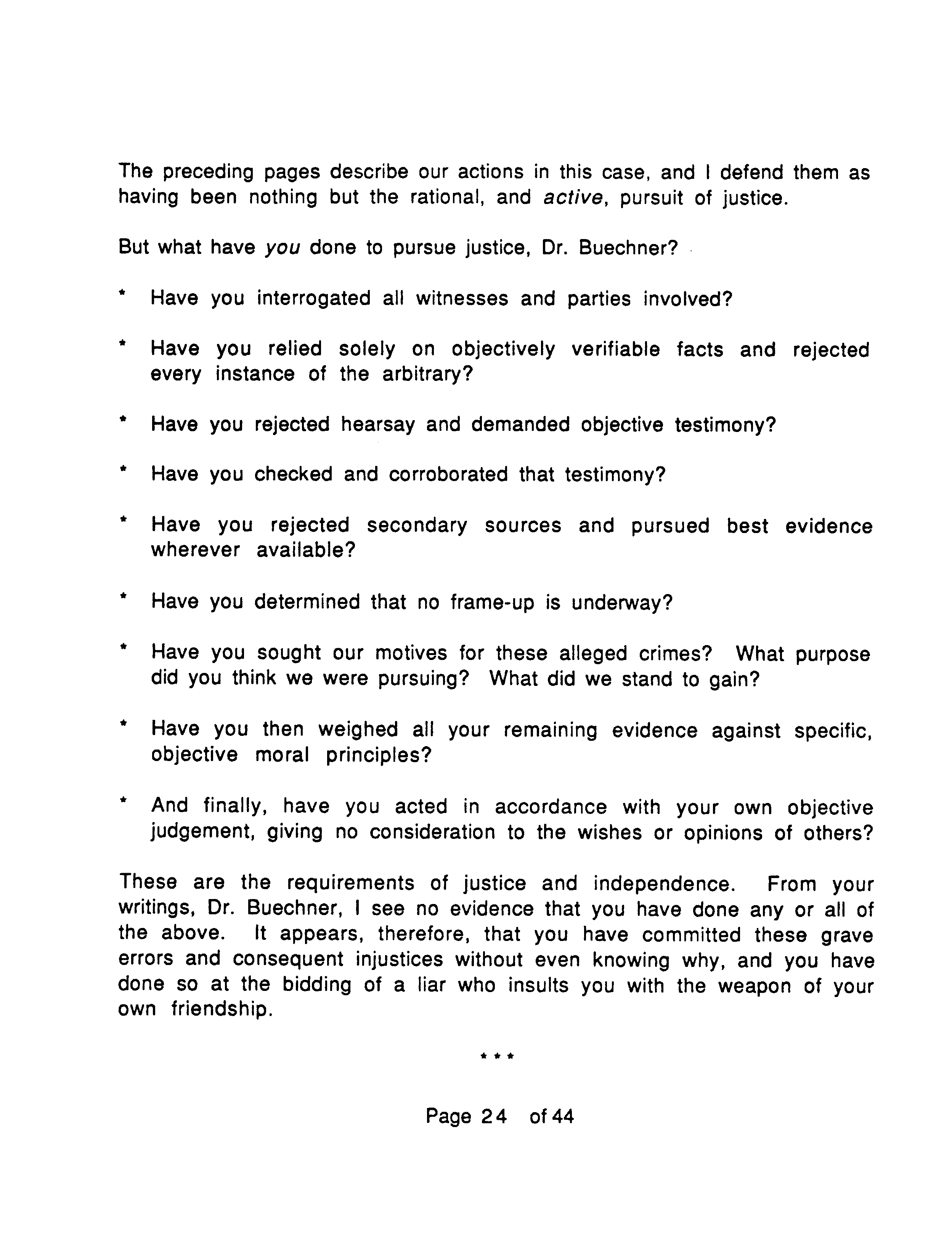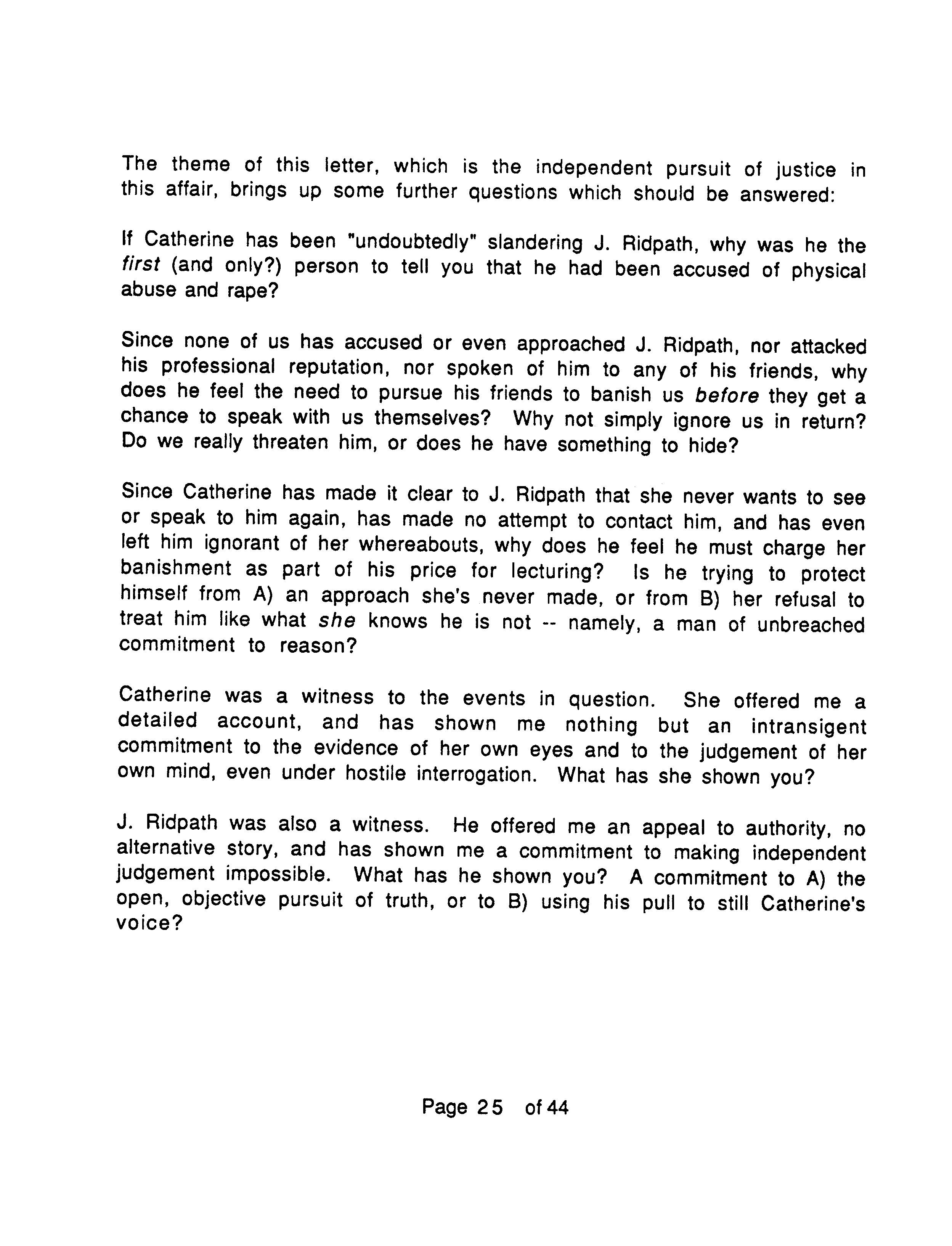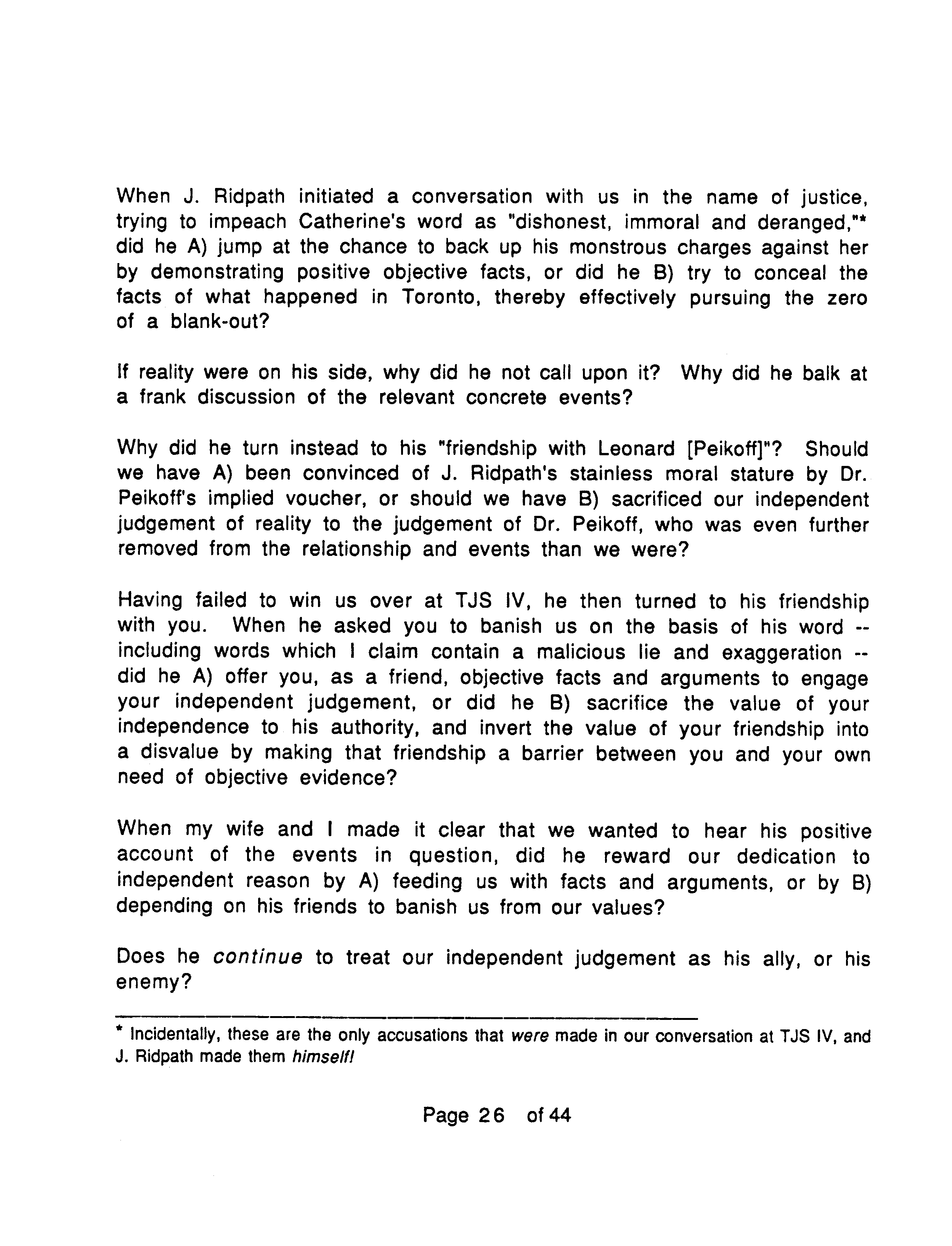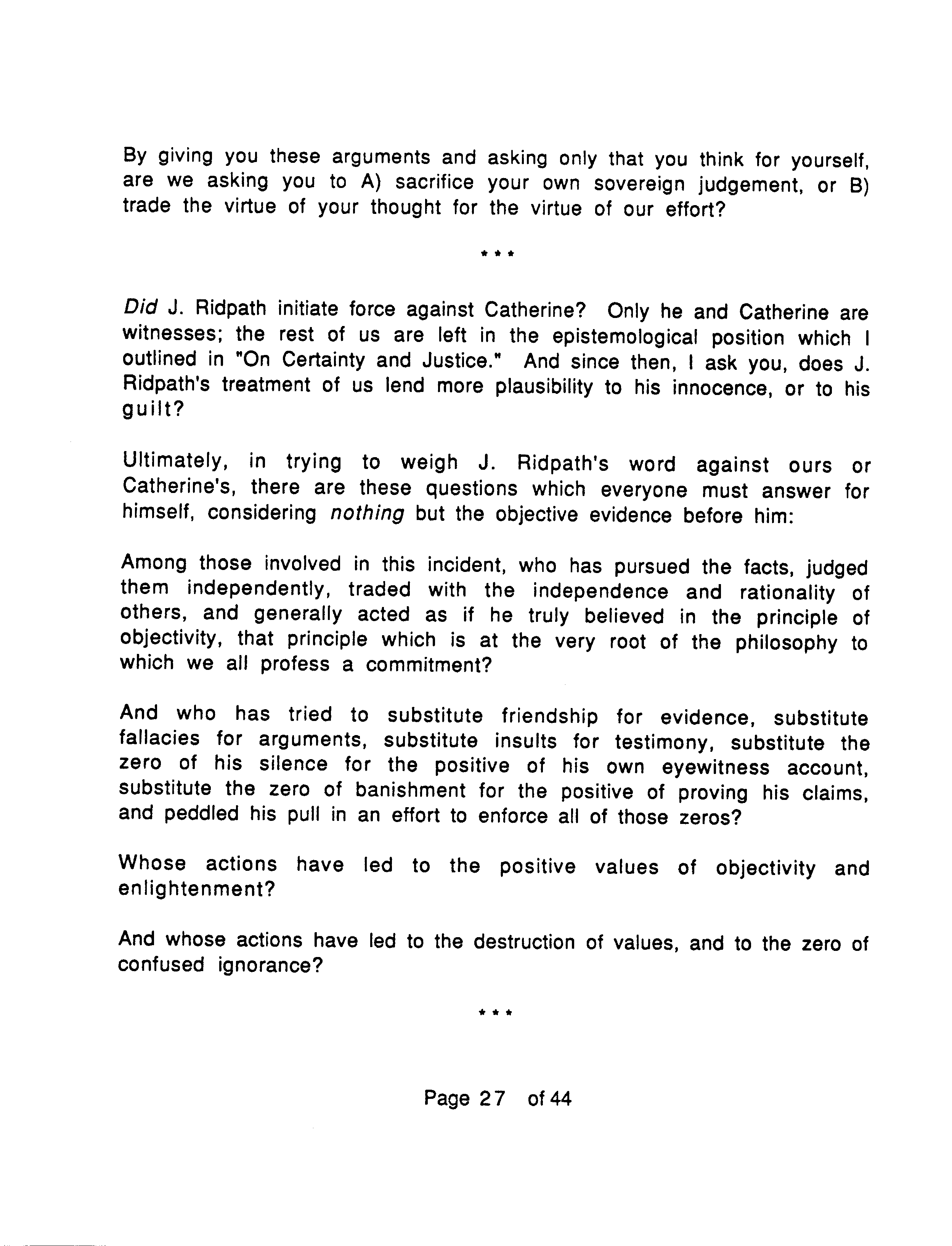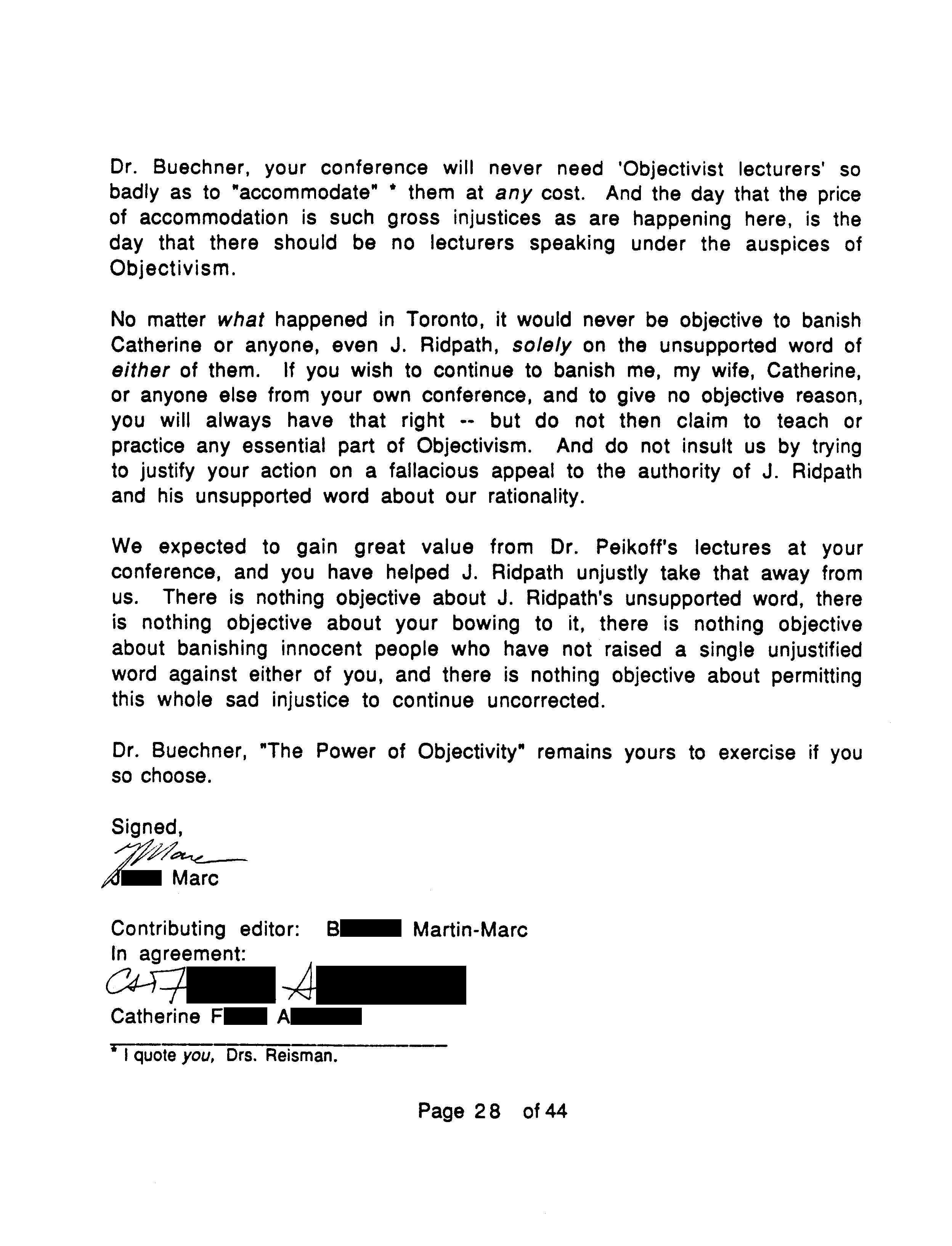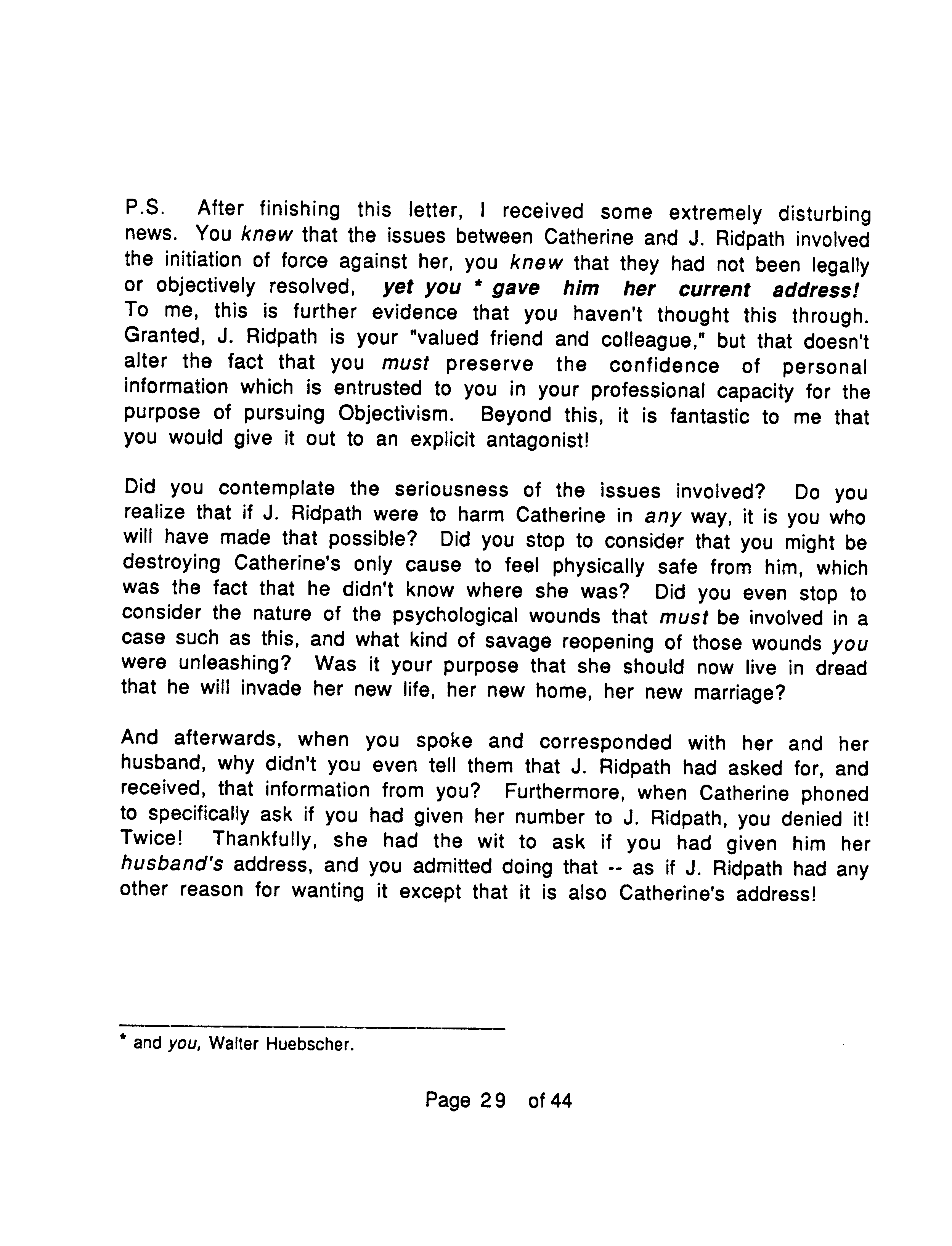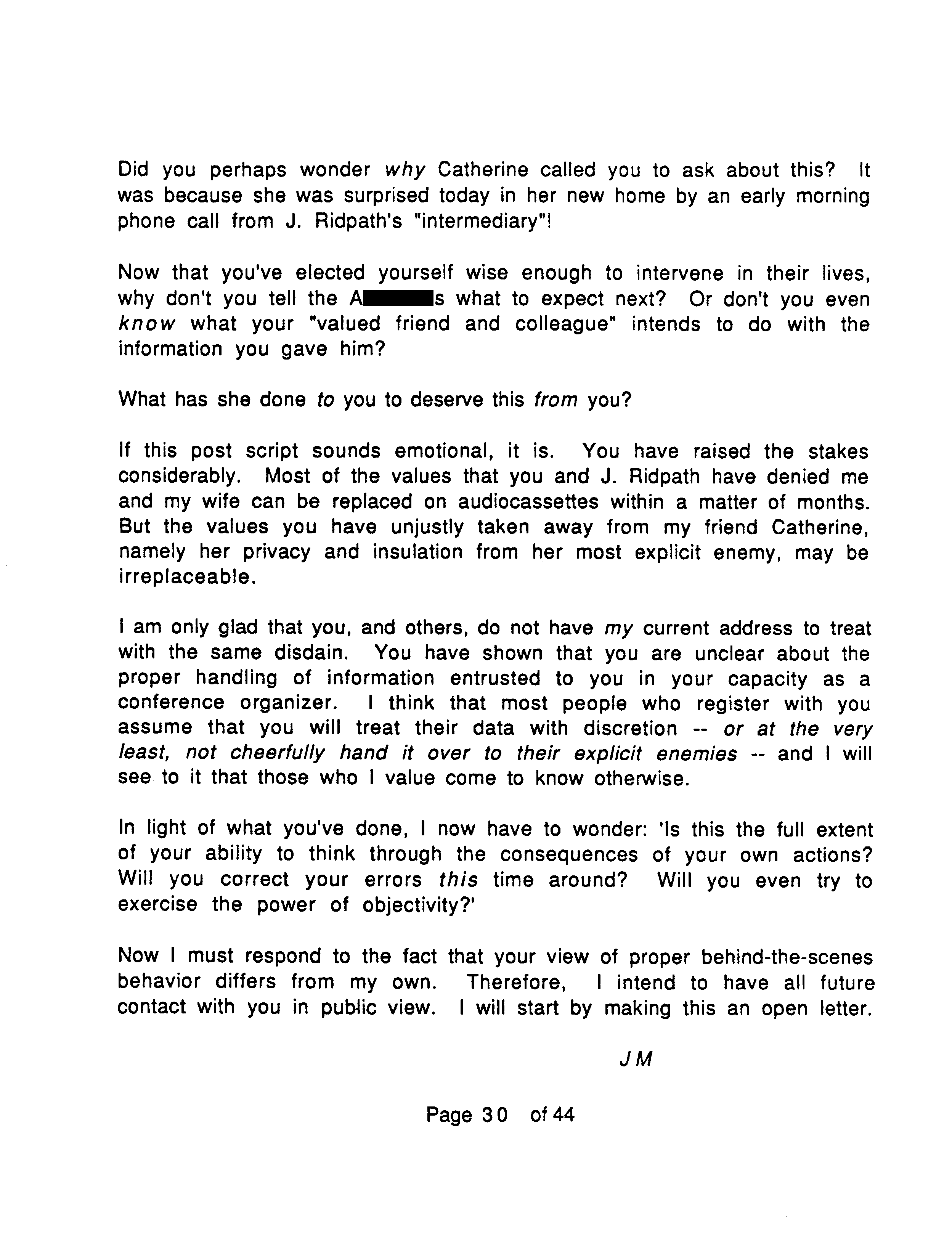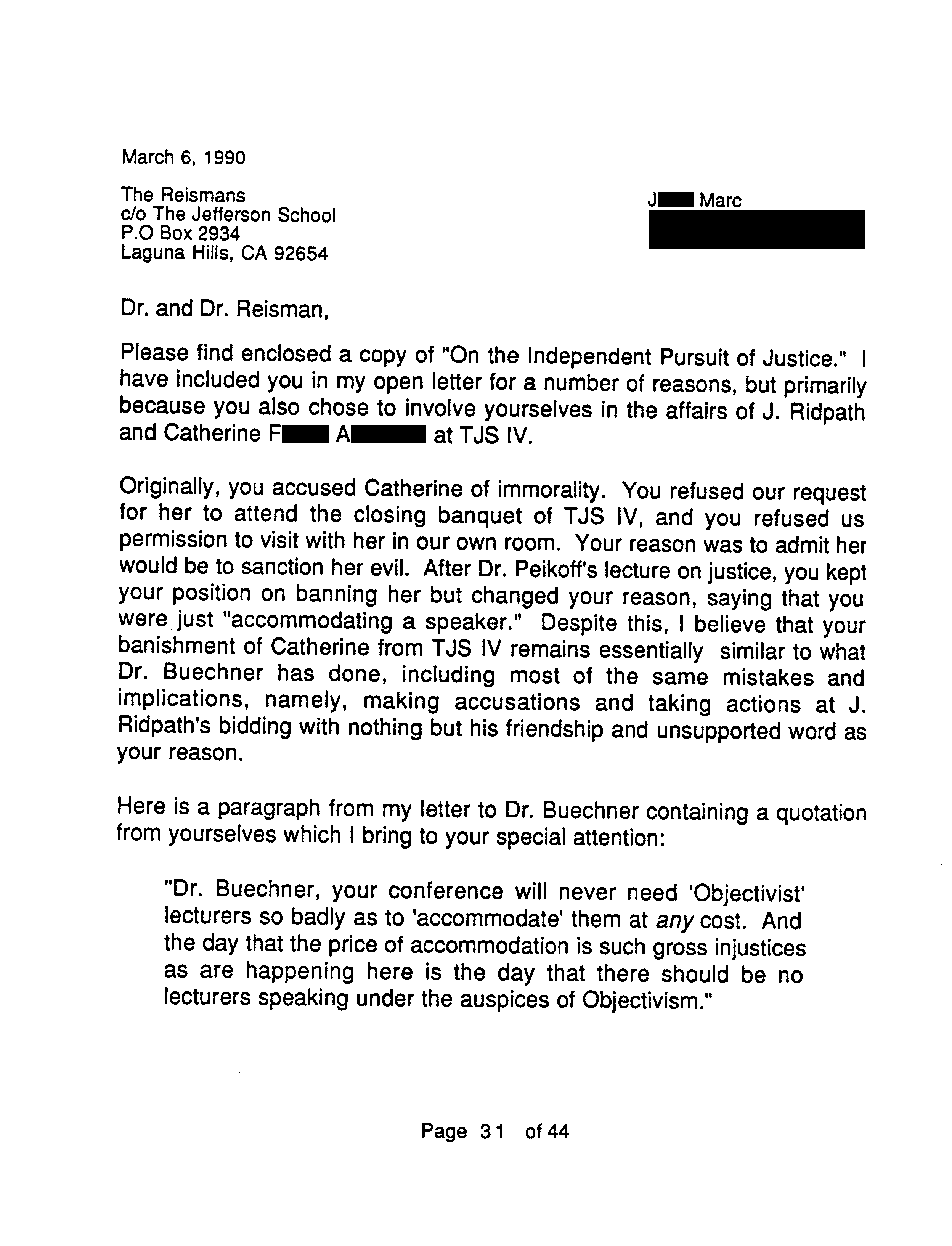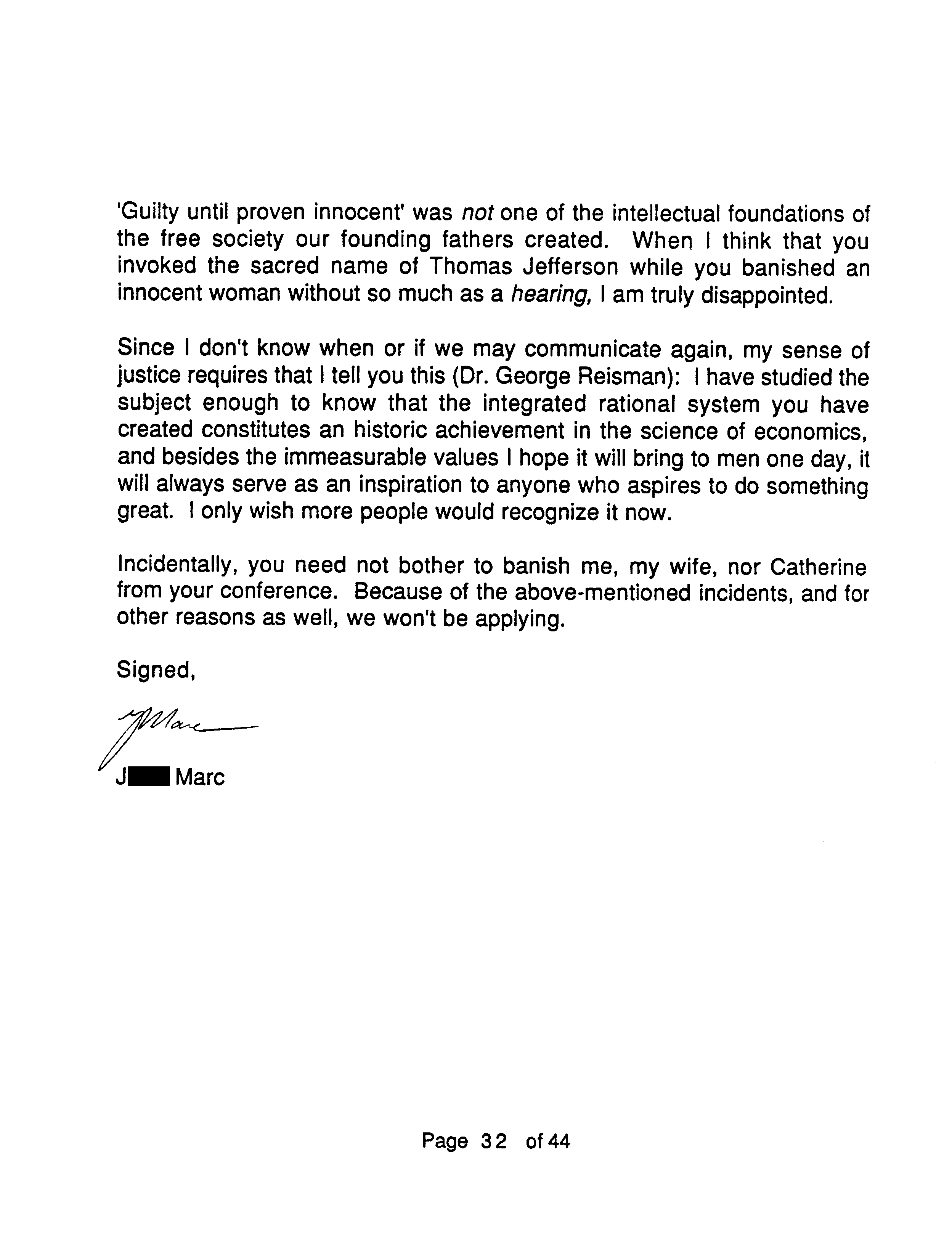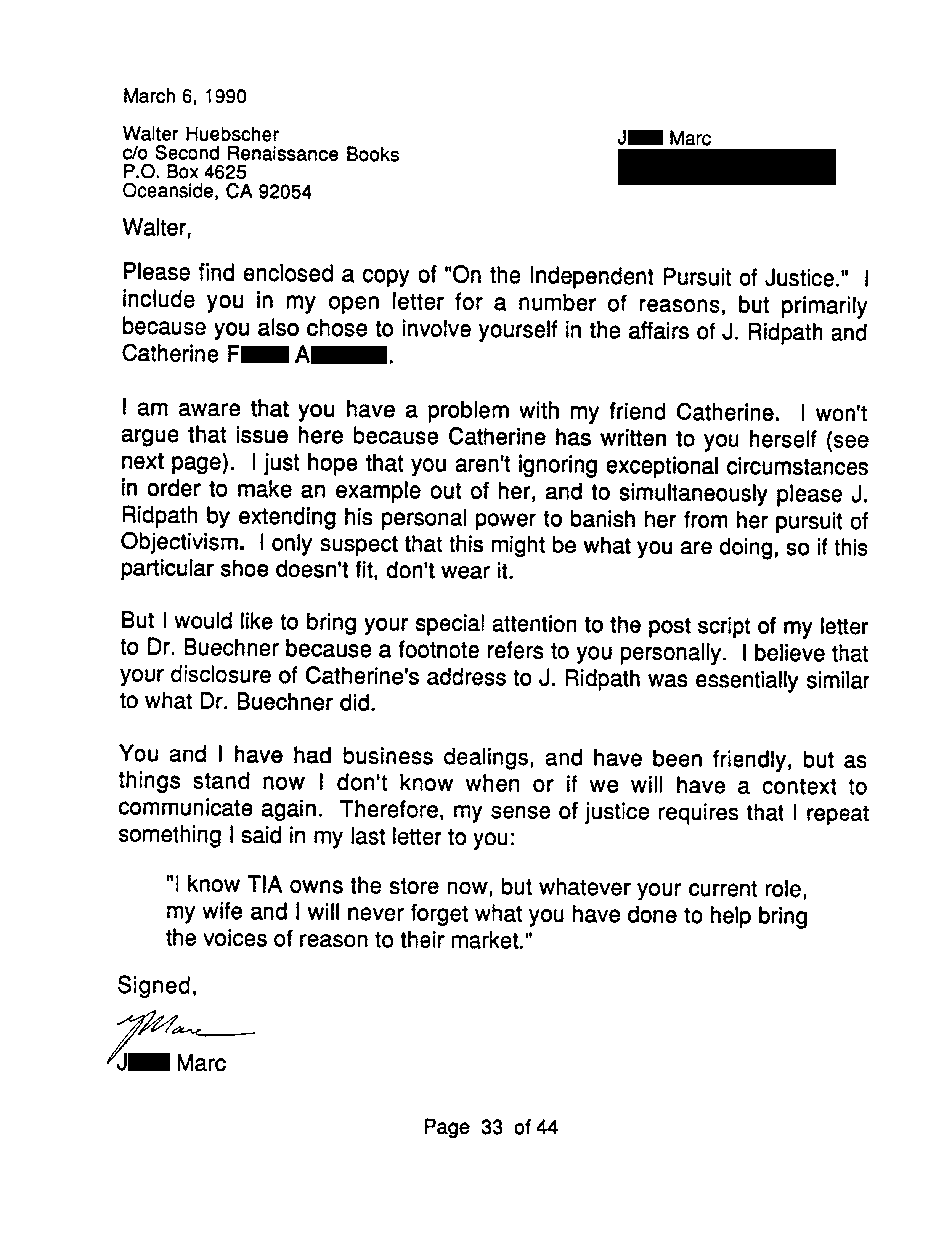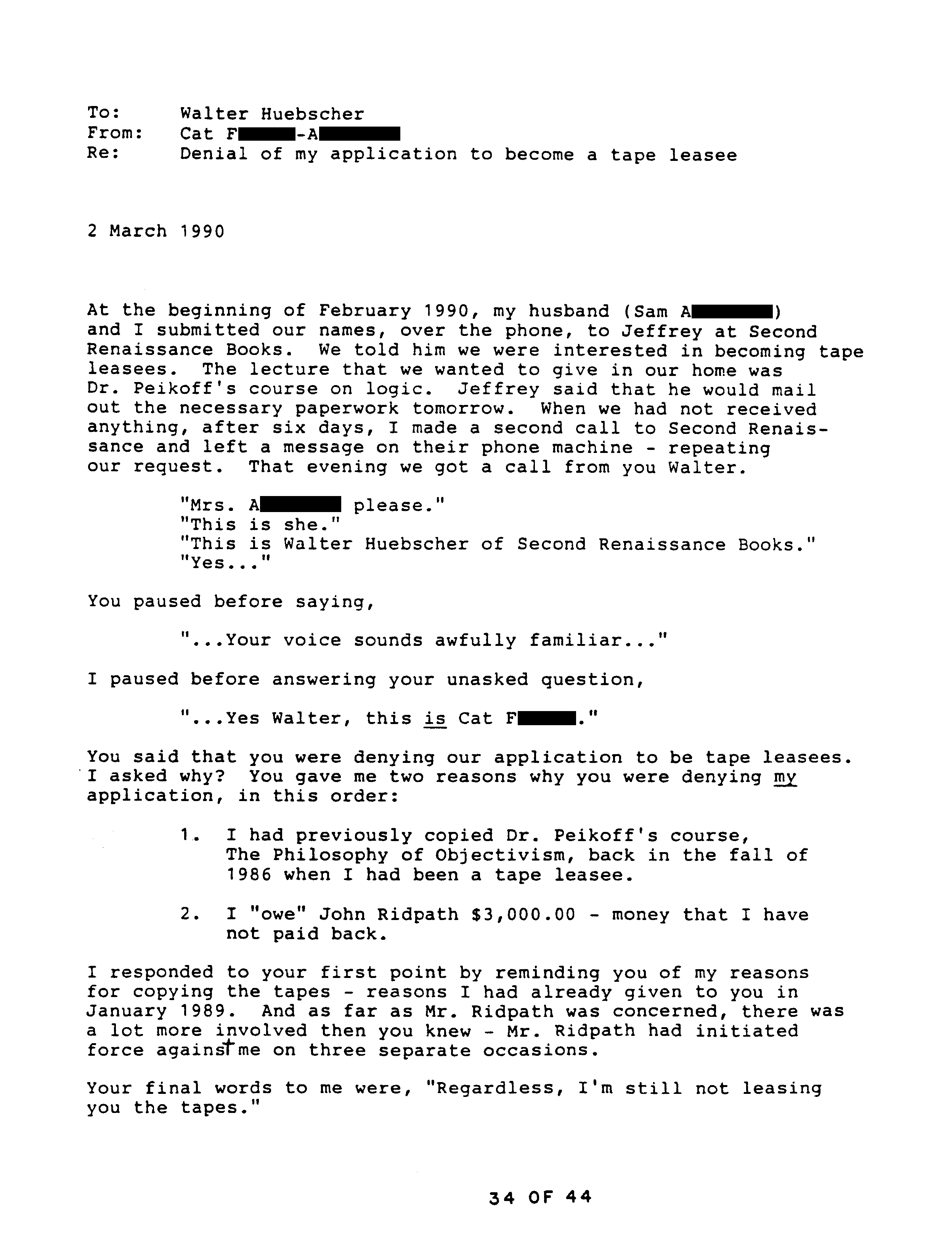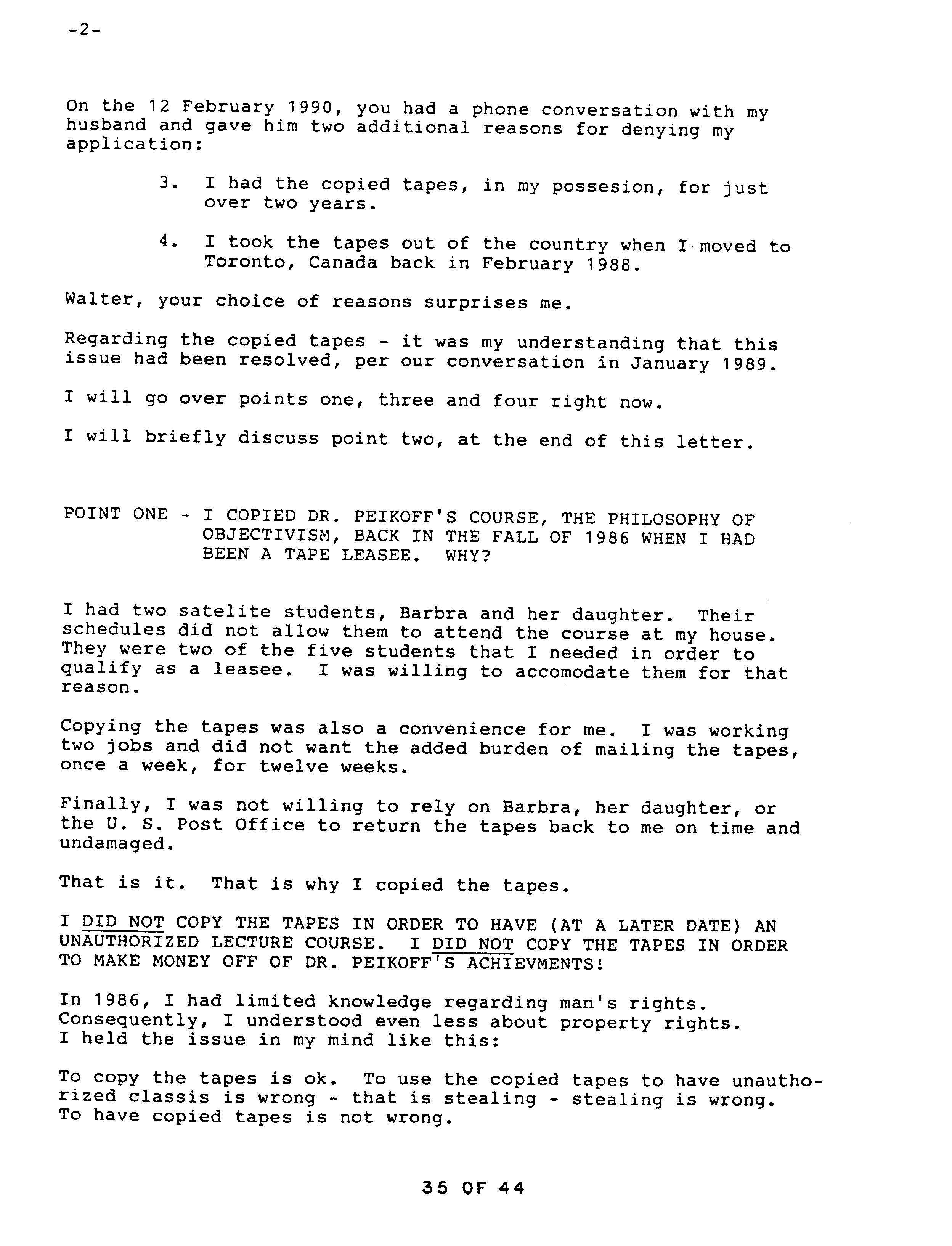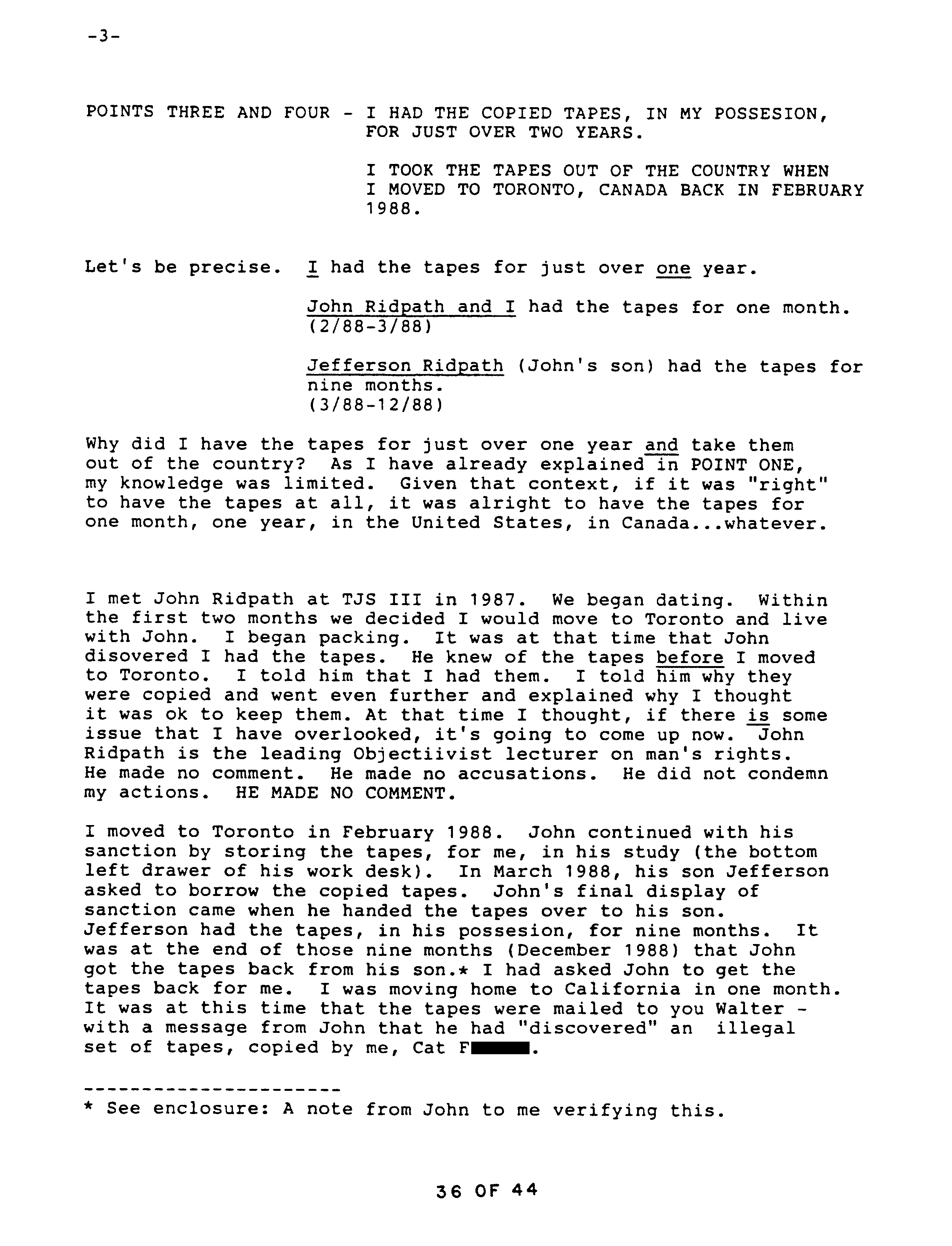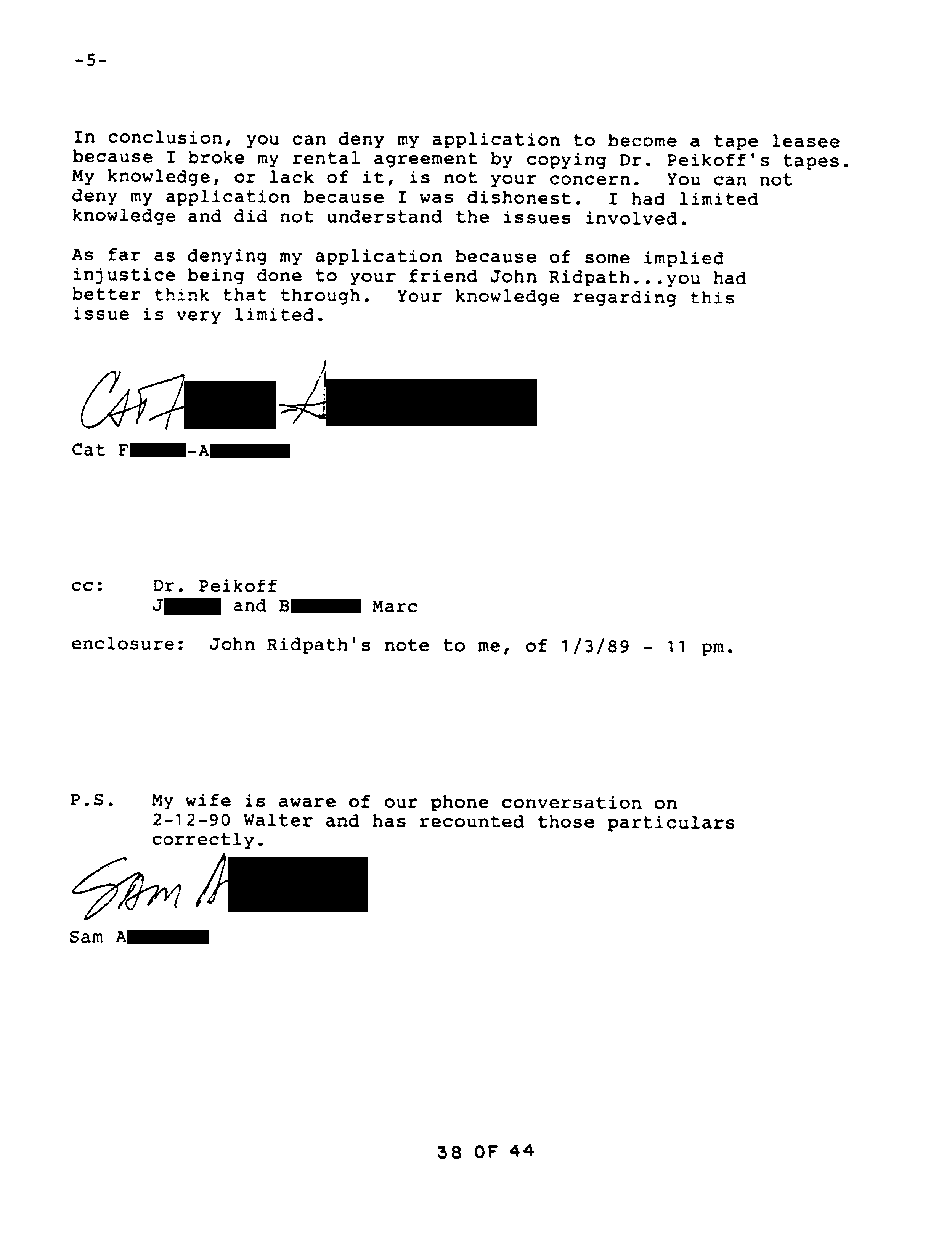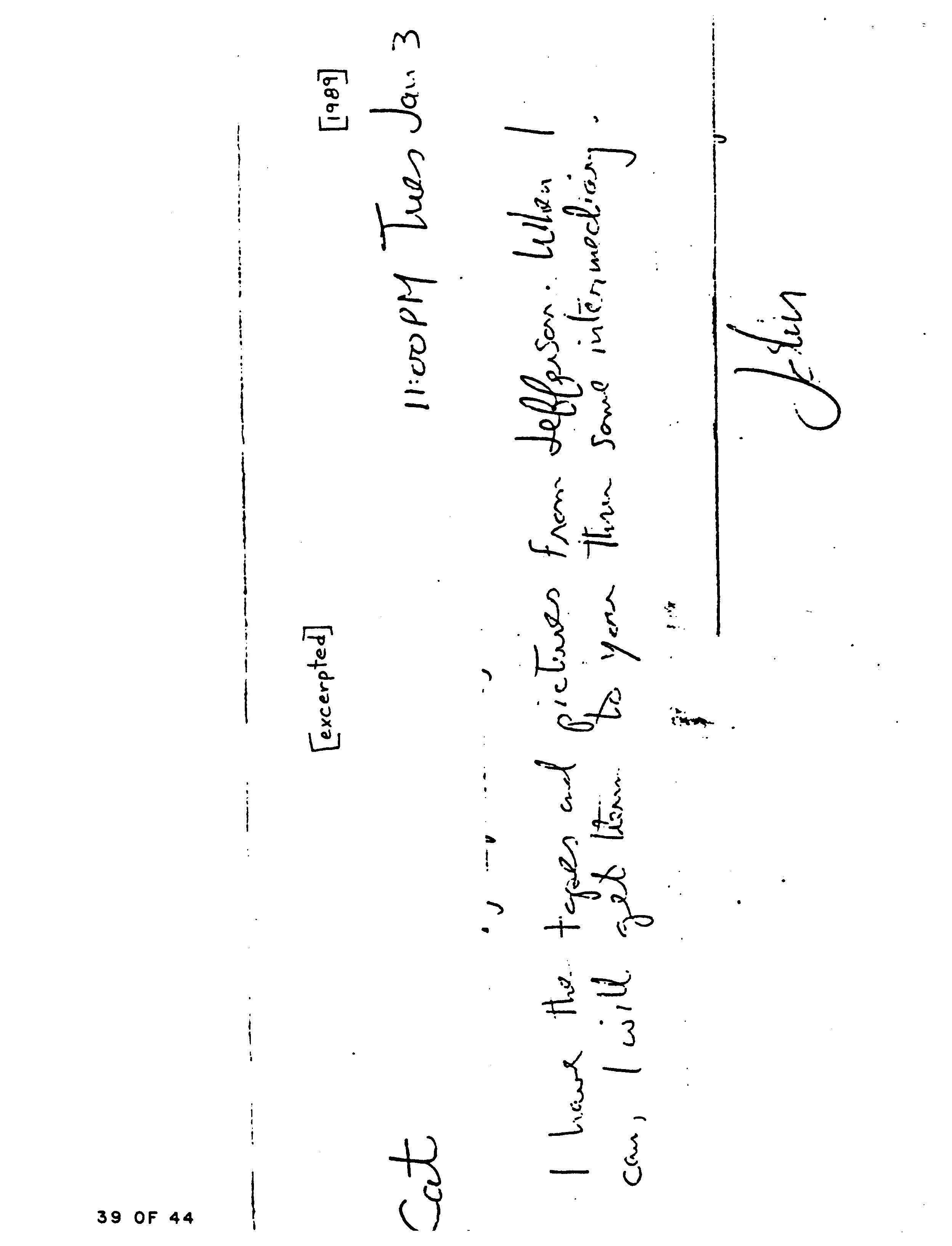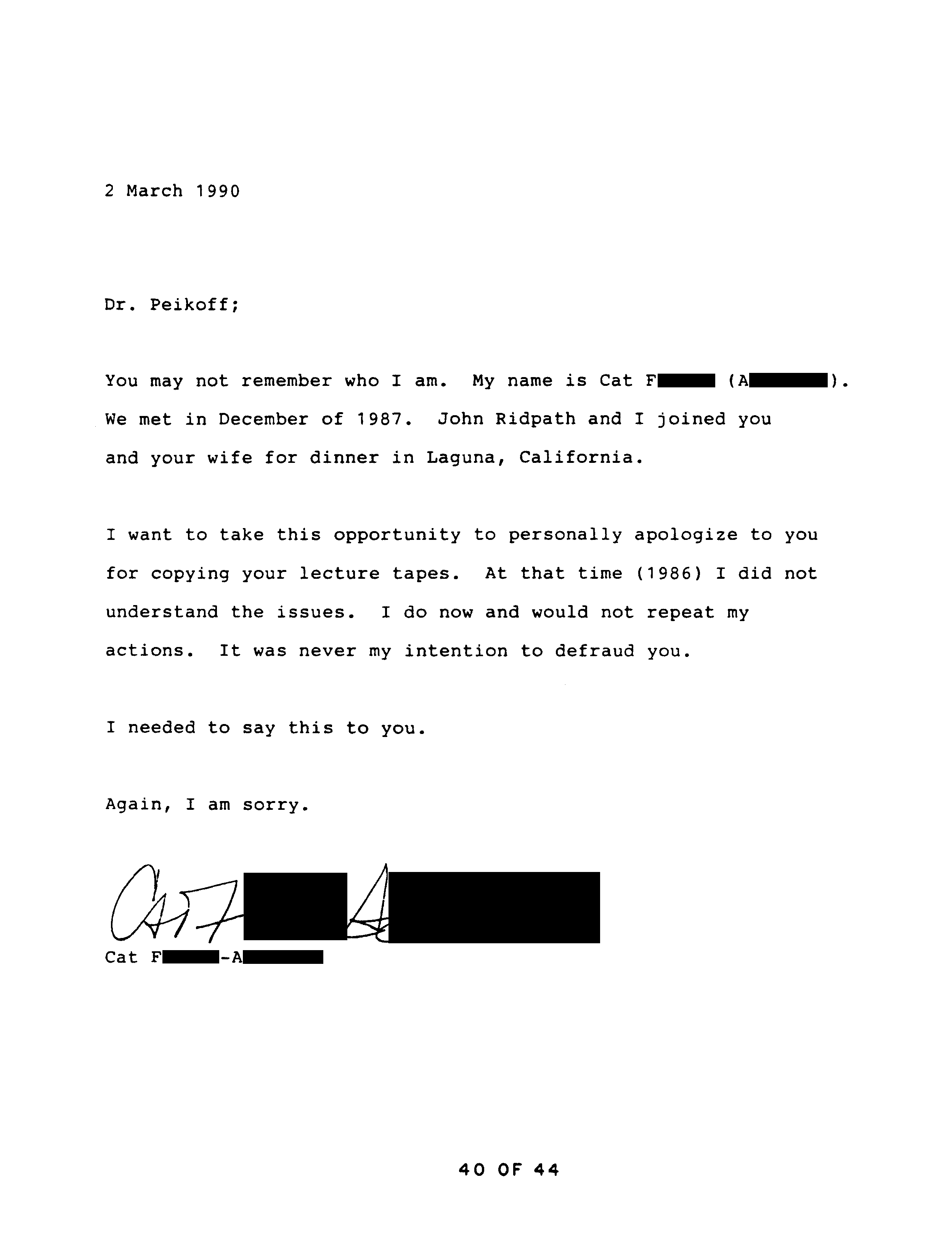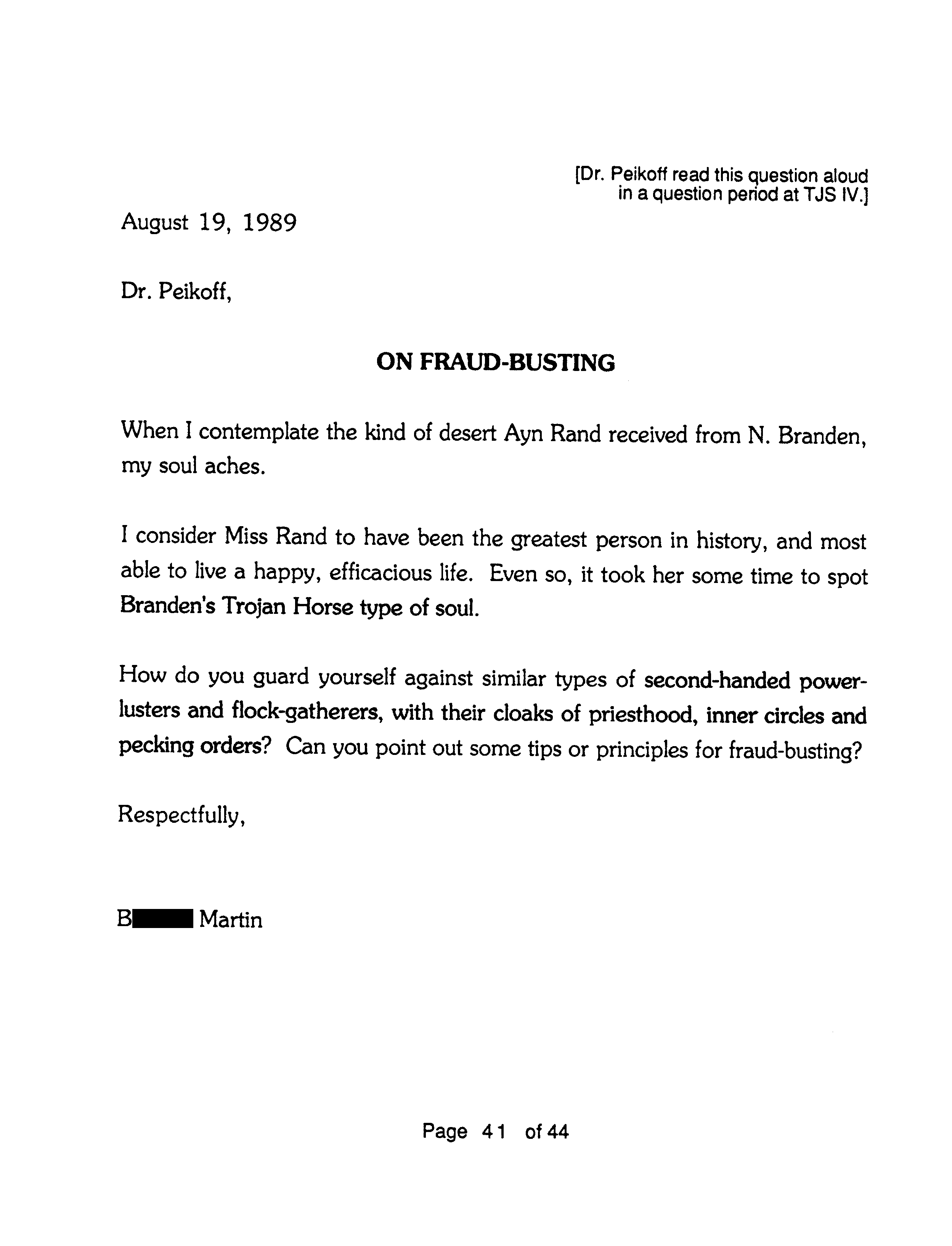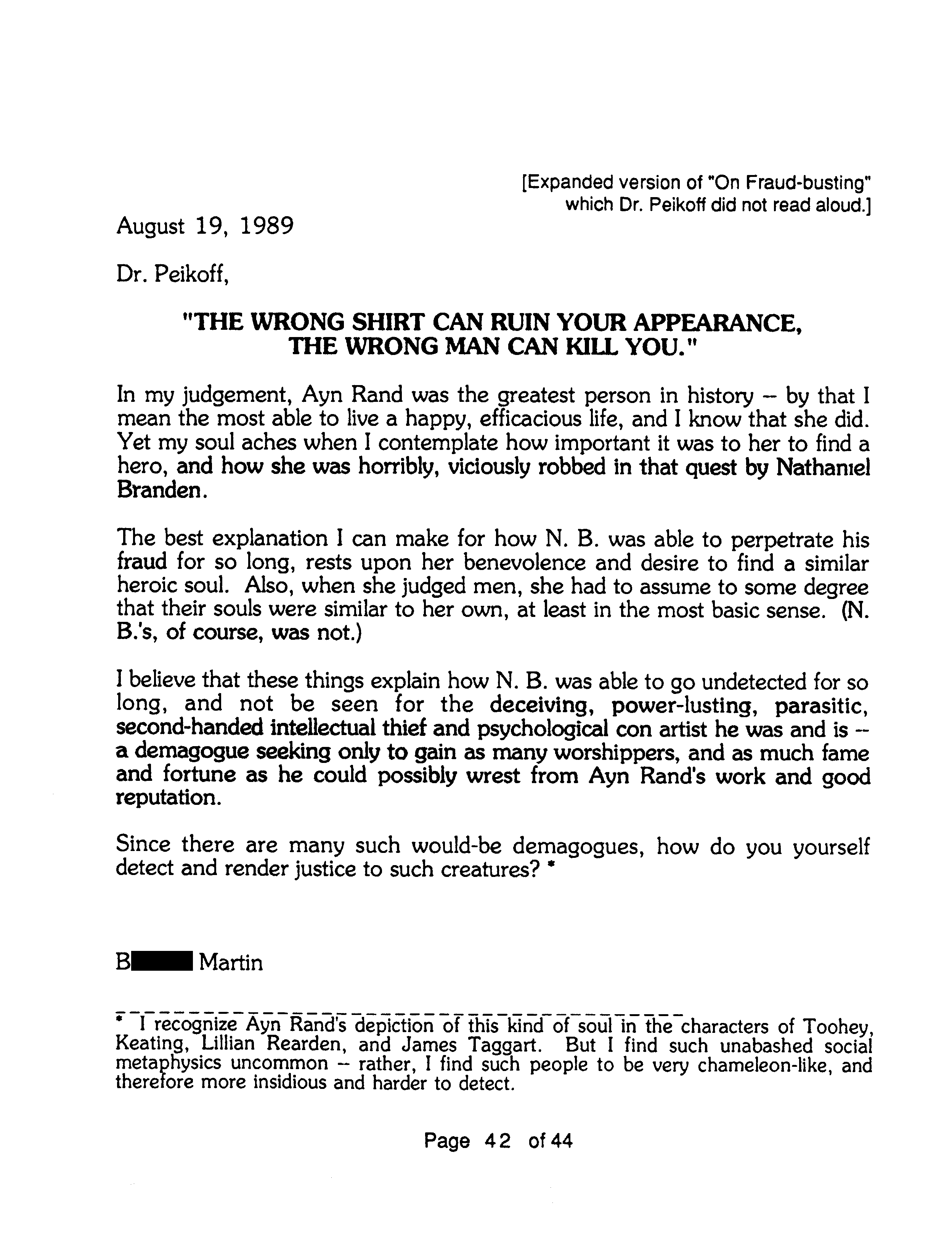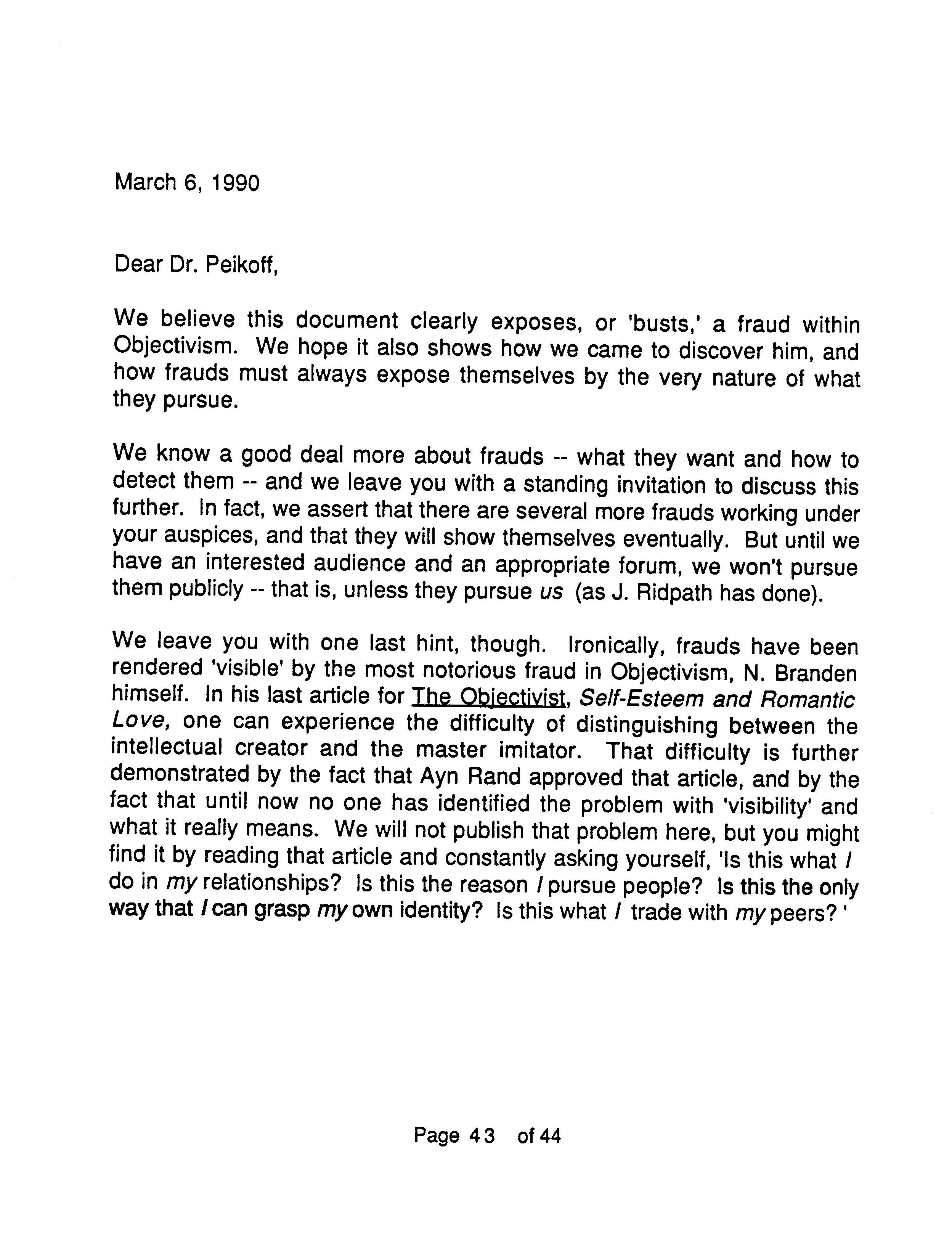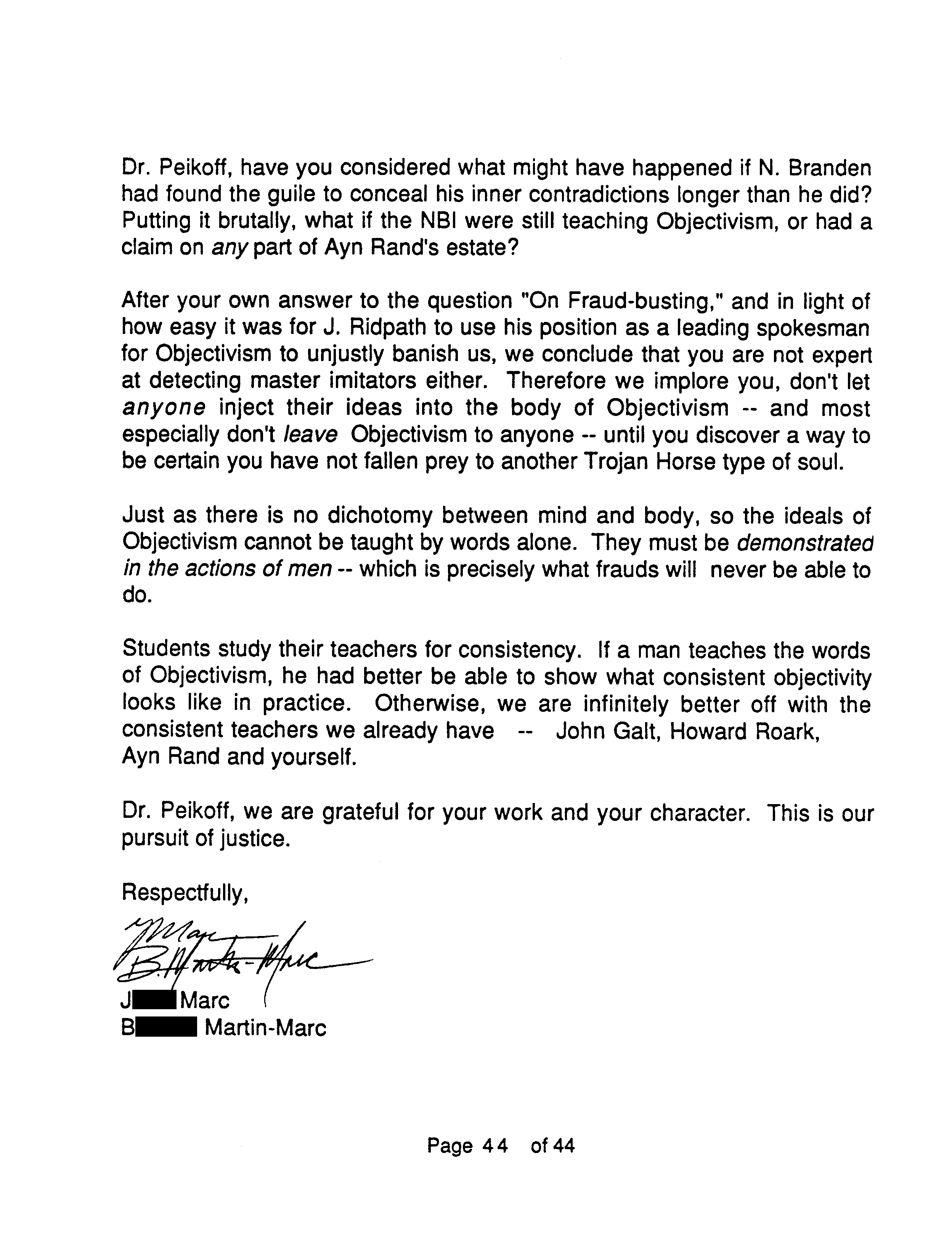| Second Allegation >> |
| Was this the face that launched a thousand ships And burnt the topless towers of Ilium ? — Doctor Faustus |
Back in 1990 several dozen people on the Objectivist (as in Ayn Rand) scene received a document in the mail with the above title. This webpage provides scans of its pages in picture format. The preface you are reading now was written in 2012 using testimony provided by one of the principal actors in the affair, B. Martin, and updated with corrections and additional material in 2018 using testimony of another, Catherine Farrar. Details not found in “On the Independent Pursuit of Justice” or commonly known within Objectivist circles are followed by an asterisk, like this: *
The authors of “On the Independent Pursuit of Justice” contend that John Ridpath, a leading spokesman for Objectivism at the time, misled several people – two of them prominent Objectivists – in order to cover up his personal life. The authors warn Leonard Peikoff, founder of the Ayn Rand Institute, that there are similar types in Objectivist circles who are “frauds” and “master imitators.”
Apparently OTIPOJ did no harm to Ridpath’s career. The Ayn Rand Institute appointed him to its board of directors in 1989 and he retired in 2011. He died in 2021.
Some names have been partly redacted considering that many years have elapsed since OTIPOJ’s original publication. The partial redaction won’t prevent the people involved from identifying each other. Here is a list, along with their associations at the time:
OTIPOJ covers the period between February 1988, when Catherine moved in with Ridpath, and March 1990, the date of the document’s publication. Catherine was an American born in 1957. * Ridpath was a Canadian born in 1936. Because OTIPOJ was written in the atmosphere of common knowledge of the people involved, it can be – despite the authors’ belief – confusing to the uninitiated reader. Several clarifying remarks follow.
Most of OTIPOJ consists of letters: copies of ordinary letters to individuals and open letters composed for OTIPOJ. A pre-release version (without the letter to Cynthia Peikoff, which hadn’t been written at that point) was mailed to Leonard Peikoff on March 7. The release version, the one provided here, was sent to the other open letter addressees as part of the mass mailing on or soon after March 23 using an Objectivist mailing list. (The release copy also contained an open letter to Peikoff dated March 19.) The letter from Catherine to Peikoff was an open letter. All other non-Marc letters – variously by Buechner, Sam, Catherine (to Huebscher) – were ordinary letters that were incorporated into OTIPOJ.
The disclaimer at the bottom of page 4 – “I am not a spokesman for Objectivism” etc. – odd as it may sound today, was once commonly used by Objectivist writers not directly associated with Ayn Rand or, later, Leonard Peikoff.
In the letter to Peikoff on page 7 dated March 19, “the urgency of your book” refers to his finishing Objectivism: the Philosophy of Ayn Rand, which came out the following year.
The open letter to Buechner starting on page 8 goes all the way to page 30. This isn’t obvious at first because this letter itself contains photocopies of other letters, and these inserted letters are given the same weight as the main letter in OTIPOJ’s Table of Contents.
The address date on page 8, February 12, is incorrect: it should be March 6 as in the header of later pages of that letter. (Perhaps the letter was started in February and finished in March.)
For readability the headers that were on pages 14 - 21, 23 - 30 (“Dr. Buechner, 3/6/90”) and on page 32 (“The Reismans, 3/6/90”) have been silently erased and placed in our blue header.
J. Marc says he made no accusation against Ridpath (page 14). He questioned him about using force against Catherine, a subject Ridpath himself had brought up right before the questioning and on two previous occasions. Only after Ridpath’s pursuit of the Marcs did the Marcs ask him if he had assaulted Catherine.
J. Marc and/or his wife saw Ridpath at all the TJS conferences and once elsewhere, and had dinner with him twice in a group setting. * Together they had been his and Catherine’s houseguests in Toronto for a week in April 1988. By the 1989 TJS IV they had had ample opportunity to study Ridpath’s personality. J. Marc was the more critical at first and his wife came to agree with his assessment.
Regarding a rhetorical question Ridpath asked the Marcs (page 18), “With everything you know about me, how can you even think this of me?”, B. Martin-Marc’s impromptu and mocking reply “Because of everything we know about you down to even how you decorate your apartment.” was her way of trying to express the comprehensive basis of her evaluation, not that there was anything peculiar about his carpet or whatever.
Buechner began acting hostile toward the Marcs and Catherine, Reisman likewise toward Catherine, and Huebscher likewise toward Catherine and her husband, because of statements made by Ridpath. The Marcs regarded these statements as slander. In OTIPOJ the Marcs focus on Ridpath’s statements, for which they could provide objective evidence, rather than his alleged assaults against Catherine. They wanted to avoid “he said, she said” where one must choose between competing claims of credibility. *
The following is part of a written question J. Marc submitted to Peikoff at the 1989 TJS IV conference and later inserted in the open letter to Buechner (page 22):
To repeat, J. Marc places the emphasis of OTIPOJ on the fact that Ridpath manipulated leading Objectivists against him, his wife and Catherine, rather than on any assault Ridpath might have committed against Catherine. On the latter point he makes no claim either way, saying that only Ridpath and Catherine know what happened.
What motivated J. Marc to write OTIPOJ ? To answer that question we must return to the Objectivist days of yesteryear when Peikoff spread his work predominately through public lectures and tape recordings. The recordings were available for lease at certain times to approved people, who then played them once to a paying audience. In order to hear complete courses of the latest lectures you had to go weekly, for up to three months, to a person’s home or rented hall. The recordings were not available for purchase nor was it known they would be in the future. Your choice was either live lectures or rental sessions. Not being able to attend the conferences where Peikoff spoke could set back your study of his work – the state of the art in Objectivism it seemed – for many months, possibly years, depending on scheduling, geographic location and so forth.
Thus the Marcs were eager to attend Peikoff’s lectures as he gave them. When Buechner barred the Marcs and Catherine from attending his Objectivist conferences, they suffered the loss of timely access to Peikoff’s work, not to mention the work of other prominent Objectivists. Ahead was the prospect of ostracism from other Objectivist conferences. The Marcs decided to write OTIPOJ and make the affair public, except that they would show a preliminary version to Leonard Peikoff so that he could suggest an alternative.
Three times they tried to bring the document to his attention. Twice through his secretary (by mail March 7 and, after a phone call, by fax March 16 * ), in both instances she declined to pass it on to Peikoff. Then once through his wife (by FedEx * March 19), she did not reply. Making OTIPOJ public – the mass mailing on or soon after March 23 – was their last resort in fighting the ban against them as well as any future whisper campaign by Ridpath and his allies. *
Another reason the Marcs wrote OTIPOJ: it was a chance, they believed their last, to try to educate Peikoff about a type of fraud described at the end of OTIPOJ. * An earlier attempt is reprinted on pages 41 and 42.
The title “On The Independent Pursuit of Justice” leads one to expect an abstract philosophical discussion whereas at best it’s a case study.
Two details in the second footnote on page 4, about “To Whom it May Concern” in the The Objectivist, are incorrect. The publisher was The Objectivist, Inc. and the year 1968.
In his letter to Cynthia Peikoff (page 6) J. Marc says he considers publishing OTIPOJ to be “imperative.” Perhaps a less forceful word would have more accurately described his feeling because almost immediately after that he says he wants Peikoff to read OTIPOJ first so he can suggest an “alternative course of redress ... .”
In one particular OTIPOJ goes too far. First a general observation. When you ask a question you also make a statement. Asking someone (not in a critical way) “Is such and such true?” implies: “I have some reason to suspect such and such might be true.” Otherwise there would be no reason to ask the question. Thus someone of whom you had asked “Is X true?” has a small hook on which to hang “You claimed X was true!” Though he’s mistaken and you did not claim X, you did imply that you thought it might be true. This observation is relevant to one point in J. Marc’s upbraiding of Buechner in his letter of February 12 / March 6, where ‘X’ is ‘Ridpath assaulted Catherine’.
Ridpath had approached J. Marc about Catherine, and J. Marc asked him if he had assaulted her. However Buechner in his letter to J. Marc accuses him of having said Ridpath assaulted Catherine, not just questioned him about it. J. Marc replies: “neither I nor my wife has accused J. Ridpath of anything.” Even though Buechner was mistaken, J. Marc overstates his own case. He makes too nice a distinction between words and what they will be taken to mean.
However, if the rest of J. Marc’s account in OTIPOJ is true he and his wife did have grounds for believing that Ridpath had assaulted Catherine, whether or not they accused him of it.
Another observation relevant to the same letter: 25 years of friendship with someone is a good reason – in the absence of other evidence – for, if not believing the friend with certainty, at least granting him more credence than a comparative stranger. And this without subjecting him to an adversarial interrogation. J. Marc’s criticism of Buechner for believing Ridpath is too strong.
On the other hand Buechner’s condemning the Marcs as immoral was itself too strong. It’s a serious charge and he failed to use a standard of proof appropriate to its level.
Buechner’s contemptuous reference (page 11) to “that woman’s unsupported word” reveals his partisan colors. Catherine’s testimony is itself evidence, and Ridpath’s word is as unsupported as hers. In affairs of this kind one cannot expect more evidence than testimony, from either side.
Ridpath’s claim that the way he decorates his apartment was half the reason the Marcs gave for (as he claims) accusing him, is absurd on its face. Buechner should have realized it.
Also telling against Buechner is his giving out confidential information. In the course of business at Conceptual Conferences he knew that Catherine had moved to a new address and what it was. Though he may not have known that Catherine had “filed a criminal complaint” against Ridpath (page 23), he did know that she claimed he had assaulted her. Buechner can reasonably be expected to know that she was afraid of Ridpath. (Even if he thought Catherine was lying he should not have taken a chance in such an important matter.) Yet when Ridpath asked Buechner for her new address, he had no problem furnishing it (page 29). Even without the assault allegations, divulging personal information to a third party would have been a breach of confidence, with the allegations it is beyond clueless.
Catherine first met Ridpath at TJS III (1987), which as usual for TJS was held in the summer. In her letter to Huebscher she writes: “We began dating. Within the first two months we decided I would move to Toronto and live with John. I began packing.” This might be a poor choice of words because a few sentences later she writes: “I moved to Toronto in February 1988.” Moving her home from Southern California * to Toronto, Canada would have been a large undertaking, still instead of “began packing” she may have meant “began making preparations.” Either that or she intended a passage of time between her sentences.
Before Catherine met Ridpath she had hosted one of Peikoff’s taped lecture courses, leased from Second Renaissance Books. In order to accommodate two paying customers (mother and daughter) who could not attend the regular sessions, she made a copy of the tapes and lent it to the pair, who later returned it to her. This violated her contract with Second Renaissance Books – wherein she agreed not to make copies or lend out the tapes.
After Catherine got together with Ridpath he knew of the copy and made no complaint, at one point even lending it to his son, returned nine months later. After Catherine broke with Ridpath he said nothing about the copy to Second Renaissance Books. According to Catherine, well after they had broken up Ridpath attacked her, and she told the Marcs about it. Only then did Ridpath inform on Catherine, telling the manager of Second Renaissance Books, Huebscher, that she possessed a copy of Peikoff’s tapes. Catherine then explained to Huebscher what she had done. Catherine repeats her explanation, which by that time she realizes is not a legitimate excuse, in a subsequent letter to Huebscher, starting on page 34.
She says she didn’t fully understand property rights, but proper behavior didn’t require understanding them, she needed only to obey the contract agreement.
She kept the copy unused (except by Ridpath’s son) for two years, moving to Toronto and back, when she might as well have discarded it. She seems to be self-righteous about keeping it for no purpose, given the blunder of copying it in the first place.
Though the tape business tells somewhat against Catherine, if what she says about Ridpath regarding it is true then he used his knowledge about the copy in an underhanded way: he rats out Catherine but not himself.
At the end of Catherine’s letter to Huebscher (page 37) she claims: “He forced his sex on me.” The apparently roundabout manner of expression may have been due to her reluctance to speak frankly about her experience, or she may have wanted to emphasize the force aspect, “force” being a trigger word in Objectivist circles.
In the same place she says emphatically that she now does not recognize Ridpath’s (moral) rights to anything. (“I do not recognize his rights to anything – be that money, recognition or courtesy!!!”) Surely an all encompassing loss of rights is hyperbole, written in anger.
J. Marc states emphatically that he never accused Ridpath of anything. It’s true he never accused Ridpath of rape. However in the written question he submitted to Peikoff (not read aloud) August 19 at the 1989 TJS IV conference (four days after his and his wife’s confrontation with Ridpath) he says an unnamed man who was an Objectivist lecturer “twice used physical force to restrain” a friend of his (Marc’s). He goes on to say that Peikoff had been friends with the man for 20 years. This would have enabled Peikoff to place the man among only a few people.
At times the writing in OTIPOJ sounds stilted, the overuse of phrases found in Ayn Rand’s work reading like clichés. Perhaps it’s some excuse that the authors were addressing an Objectivist audience and wanted to take advantage of a shared experience in order to be better understood. He quotes Ayn Rand outright a couple of times. Elsewhere he may have unconsciously imitated phrases from her writing, like an acquired regional accent. The reader should look beyond this stylistic flaw and focus on the meat of his account.
As for what an uncharitable critic might call “wearing one’s virtue on one’s sleeve” common among students of Objectivism, a sort of ethical touchiness and exaggerated moral tone: keep in mind as you read that the issues involved were very important to the authors at the time, understandably so. Though a righteous attitude is annoying when the bearer is a phony – and there are a lot of phonies in Objectivism – the Marcs appear to be sincere.
The organized Objectivist movement (an idea Ayn Rand herself rejected) tends to run to open letters. Those of Ayn Rand, David Kelley, George Reisman and John McCaskey – listed chronologically – are well-known. File this one between Kelley and Reisman. Setting aside its allegations the document itself is an authentic bit of the history of organized Objectivism.
